|
Tony Benn: Democracy and Marxism Tony Benn was one of the most distinctive political figures of the past 70 years. His views on the economy, The EU and foreign wars put him at odds with the political establishment and many within Labour, his own party. Tony Benn often gave us almost sage-like comments on society and the politics surrounding it, his speeches and talks reflected the deep richness of well thought out arguments delivered by a master orator. Tony Benn was a remarkable man with great gifts that he put at the service of his country. But just as importantly, and he would have emphasised this, he was in a tradition of radical socialists. He wanted his epitaph to be ‘He encouraged us’. It is from his works and reproduced speeches and writings many socialists find a little light and understanding. In his own words, Benn explains the dangers and repercussions of the Labour Party moving away from its core values and its Left-wing political doctoring’s. This resulted as we well know, in the collapse of the Labour Party under Blair, until it re-established its Left-wing credentials under Corbyn. Benn writes: “I am an example of someone who moved to the left as I got older. I have known many people who were very left-wing when they were young who ended up as Conservatives. But the experience of government made me realise that Labour was not engaged, as it said it was, in changing society but to make people change to get used to the society we had.” -Tony Benn. On the Blairites, a centrist political ideology that now forms the foundations of Sir Keir Starmer’s hollow ideology of Starmirisim, Tony Benn pointed out the collapse of public support for Blairism, and why: “We are paying a heavy political price for 20 years in which, as a party, we have played down our criticism of capitalism and soft-pedalled our advocacy of socialism.” He also said, as is today within the Labour party: “To be embarrassed by socialism was very much a characteristic of New Labour.” The Labour Party is once more heading down the road to nowhere, led by the centrists liberal elite, who have no real values or understanding of the working class and their aim to disassociate from the Labour Parties Marxist traditions is underway, we thought now would be a timely reminder of the Labour Parties association with Marxism and a little understanding of the Labour Parties roots, after all its founder Keir Hardie was a Marxist. While Sir Keir Starmer openly attacks the Left within the Labour Party and is busy digging those foundations up, an act that very much looks like his true intent is to bring the entire house down. We bring to your attention the words of Tony Benn in his address in 1982 ‘Marxism Today,’ a theoretical magazine of the Communist Party of Great Britain. Benn was articulating a theory very different from anything said by a leading politician before. It was also, clearly subversive. Article By Tony Benn May 1982 Marxism Today Marxism has only had a limited influence in the British Labour movement: but it will play a crucial role in its future. Tony Benn Though I was not introduced to socialism through a study of Marx, and would not describe myself as a Marxist, I regard it as a privilege and an honour to have been invited to deliver this Lecture in memory of Karl Marx. The intellectual contribution made by Marx to the development of socialism was and remains absolutely unique. But Marx was much more than a philosopher. His influence in moving people all over the world to social action ranks him with the founders of the world’s greatest faiths. And, like the founders of other faiths, what Marx and others inspired has given millions of people hope, as well as the courage to face persecution and imprisonment. Since 1917, when the Bolsheviks came to power in the Soviet Union, we have had a great deal of experience of national power structures created in the name of Marxism, and of the achievements and failures of those systems. Some of the sternest critics of Soviet society also based themselves upon Marx, including Leon Trotsky, Mao Tse-Tung, Tito and a range of libertarian Marxist dissidents in Eastern Europe and Eurocommunists in the West. This Lecture is concerned with only two aspects of Marxism.First, the challenge which Marxism presents to liberal capitalist societies which have achieved a form of political democracy based upon universal adult suffrage: and second, the challenge to those societies, which have based themselves on Marxism by the demands for political democracy. It is, I believe, through a study of this mutual challenge that we can get to the heart of many of the problems now confronting the communist and the non-communist countries, and illuminate the conflicts within and between different economic systems and between the developed and the developing world. Before I begin, let me make my own convictions clear. ⦁I believe that no mature tradition of political democracy today can survive if it does not open itself to the influence of Marx and Marxism. The evolution of British democracyIf an understanding of socialism begins — as it must — with a scientific study of our own experience, each country can best begin by examining its own history and the struggles of its people for social, economic and political progress. British socialists can identify many sources from which our ideas have been drawn. The teachings of Jesus, calling upon us to ‘.Jove our neighbour as ourselves’ acquired a revolutionary character when preached as a guide to social action. For example, when, in the Peasants Revolt of 1381, the Reverend John Ball, with his liberation theology, allied himself to a popular uprising, both he, the preacher, and Wat Tyler, the peasant leader, were killed and their followers scattered and crushed by the King. John Ball, one of the leaders of the Peasants‘ Revolt in England. The message of social justice, equality and democracy, is a very old one, and has been carried like a torch from generation to generation by a succession of popular and religious movements, by writers, philosophers, preachers, and poets, and has remained a focus of hope, that an alternative society could be constructed. The national political influences of these ideas was seen in 17th, 18th, 19th and 20th centuries, and in the revolutions in England, America, France and Russia, each of which provided an important impetus to these hopes. But it was the Industrial Revolution, and the emergence of modern trade unionism in the 19th century which provided a solid foundation of common interest upon which these Utopian dreams could be based, that gave the campaigns for political democracy and social advance their first real chance of success. If British experience is unique — as it is — in the history of the working class movement, it lies in the fact that the Industrial Revolution began here, and gave birth to the three main economic philosophies which now dominate the thinking of the world. The first was capitalism. Adam Smith, in his Wealth of Nations, developed the concept of modern capitalism as the best way to release the forces of technology from the dead hand of a declining and corrupted feudalism, substituting the invisible hand of the market and paving the way for industrial expansion and, later, imperialism. The Manchester School of liberal economists and the liberal view of an extended franchise combined to create a power structure which still commands wide support among the establishment today. The second was socialism. Robert Owen, the first man specifically identified as a socialist, also developed his ideas of socialism, cooperation and industrial trade unionism out of his experience of the workings of British capitalism. And the third was Marxism. Marx and Engels also evolved many of their views of scientific socialism from a detailed examination of the nature of British capitalism and the conditions of the working class movement within it. Yet, despite the fact that capitalism, socialism and Marxism all first developed in this country, only one of these schools of thought is now accepted by the establishment as being legitimate. Capitalism, its mechanisms, values and institutions are now being preached with renewed vigour by the British establishment under the influence of Milton Friedman. Socialism is attacked as being, at best, romantic or, at worst, destructive. And Marxism is identified as the anti-Christ against which the full weight of official opinion is continually pitted in the propaganda war of ideas. The distortion of MarxismBBC implied subliminal Corbyn wearing a Russian hat with a backdrop of the Kremilin. The term Marxist is used by the establishment to prevent it being understood. Even serious writers and broadcasters in the British media use the word Marxist as if it were synonymous with terrorism, violence, espionage, thought control, Russian imperialism and every act of bureaucracy attributable to the state machine in any country, including Britain, which has adopted even the mildest left of centre political or social reforms. The effect of this is to isolate Britain from having an understanding of, or a real influence in, the rest of the world, where Marxism is seriously discussed and not drowned by propaganda, as it is in our so-called free press. This ideological insularity harms us all. This continuing barrage of abuse is maintained at such a high level of intensity that it has obliterated — as is intended — any serious public debate in the mainstream media on what Marxism is about. This negative propaganda is comparable to the treatment accorded to Christianity in non-Christian societies. Any sustained challenge to the existing order that cannot be answered on its merits is dismissed as coming from a Marxist, Communist, Trotskyite, or extremist. All those suspected of Marxist views run the risk of being listed in police files, having their phones tapped and their career prospects stunted by blacklisting, just as those who advocate liberal ideas will be harassed in the USSR. Those who openly declare their adherence to Marxism are pilloried as self confessed Marxists, as if they had pleaded guilty to a serious crime and were held in custody awaiting trial. Even the Labour Party, in which Marxist ideas have had a minority influence, is now described as a Marxist party, as if such a statement of itself put the party beyond the pale of civilised conduct, its arguments required no further answer, and its policies are entitled to no proper presentation to the public on the media. One aspect of this propaganda assault which merits notice is that it is mainly waged by those who have never studied Marx, and do not understand what he was saying, or why, yet still regard themselves as highly educated because they have passed all the stages necessary to acquire a university degree. For virtually the whole British establishment has been, at least until recently, educated without any real knowledge of Marxism, and is determined to see that these ideas do not reach the public. This constitutes a major weakness for the British people as a whole. Six Reasons why Marxism is fearedThe People’s Charter Why then is Marxism so widely abused? In seeking the answer to that question we shall find the nature of the Marxist challenge in the capitalist democracies. The danger of Marxism is seen by the establishment to lie in the following characteristics. First, Marxism is feared because it contains an analysis of an inherent, ineradicable conflict between capital and labour — the theory of the class struggle. Until this theory was first propounded the idea of social class was widely understood and openly discussed by the upper and middle classes, as in England until Victorian times and later. But when Marx launched the idea of working class solidarity, as a key to the mobilisation of the forces of social change and the inevitability of victory that that would secure, the term ‘class’ was conveniently dropped in favour of the idea of national unity around which there existed a supposed common interest in economic and social advance within our system of society, whether that common interest is real or not. Anyone today who speaks of class in the context of politics runs the risk of excommunication and outlawry. In short, they themselves become casualties in the class war which those who have fired on them claim does not exist. Second, Marxism is feared because Marx’s analysis of capitalism led him to a study of the role of state power as offering a supportive structure of administration, justice and law enforcement which, far from being objective and impartial in its dealings with the people, was, he argued, in fact, an expression of the interests of the established order and the means by which it sustains itself. One recent example of this was Lord Denning’s 1980 Dimbleby Lecture. It unintentionally confirmed that interpretation in respect of the judiciary and is interesting mainly because few 20th century judges have been foolish enough to let that cat out of the bag, where it has been quietly hiding for so many years. Third, Marxism is feared because it provides the trade union and labour movement with an analysis of society that inevitably arouses political consciousness, taking it beyond wage militancy within capitalism. The impotence of much American trade unionism and the weakness of past non-political trade unionism in Britain have borne witness to the strength of the argument for a labour movement with a conscious political perspective that campaigns for the reshaping of society, and does not just compete with its own people for a larger part of a fixed share of money allocated as wages by those who own capital, and who continue to decide what that share will be. Fourth, Marxism is feared because it is international in outlook, appeals widely to working people everywhere, and contains within its internationalism a potential that is strong enough to defeat imperialism, neo-colonialism and multinational business and finance, which have always organised internationally. But international capital has fended off the power of international labour by resorting to cynical appeals to nationalism by stirring up suspicion and hatred against outside enemies. This fear of Marxism has been intensified since 1917 by the claim that all international Marxism stems from the Kremlin, whose interests all Marxists are alleged to serve slavishly, thus making them, according to capitalist establishment propaganda, the witting or unwitting agents of the national interest of the USSR. Fifth, Marxism is feared because it is seen as a threat to the older organised religions, as expressed through their hierarchies and temporal power structures, and their close alliance with other manifestations of state and economic power. The political establishments of the West, which for centuries have openly worshipped money and profit and ignored the fundamental teachings of Jesus do, in fact, sense in Marxism a moral challenge to their shallow and corrupted values and it makes them very uncomfortable. Ritualised and mystical religious teachings, which offer advice to the rich to be good, and the poor to be patient, each seeking personal salvation in this world and eternal life in the next, are also liable to be unsuccessful in the face of such a strong moral challenge as socialism makes. There have, over the centuries, always been some Christians who, remembering the teachings of Jesus, have espoused these ideas and today there are many radical Christians who have joined hands with working people in their struggles. The liberation theology of Latin America proves this and thus deepens the anxieties of church and state in the West. Sixth, Marxism is feared in Britain precisely because it is believed by many in the establishment to be capable of winning consent for radical change through its influence in the trade union movement, and then in the election of socialist candidates through the ballot box. It is indeed therefore because the establishment believes in the real possibility of an advance of Marxist ideas by fully democratic means that they have had to devote so much time and effort to the Even serious writers and broadcasters in the British media use the word Marxist as if it were synonymous with terrorismmisrepresentation of Marxism as a philosophy of violence and destruction, to scare people away from listening to what Marxists have to say. These six fears, which are both expressed and fanned by those who defend a particular social order, actually pinpoint the wide appeal of Marxism, its durability and its strength more accurately than many advocates of Marxism may appreciate. Marxism and the Labour PartyIf the Labour Party could be bullied or persuaded to denounce its Marxists, the media having tasted blood would demand next that it expelled all its socialists The Communist Manifesto, and many other works of Marxist philosophy, have always profoundly influenced the British labour movement and the British Labour Party, and have strengthened our understanding and enriched our thinking. It would be as unthinkable to try to construct the Labour Party without Marx as it would be to establish university faculties of astronomy, anthropology or psychology without permitting the study of Copernicus, Darwin or Freud, and still expect such faculties to be taken seriously. There is also a practical reason for emphasising this point now. The attacks upon the so-called hard Left of the Labour Party by its opponents in the Conservative, Liberal and Social Democratic Parties and by the establishment, are not motivated by fear of the influence of Marxists alone. These attacks are really directed at all socialists and derive from the knowledge that democratic socialism in all its aspects does reflect the true interest of a majority of people in this country, and that what democratic socialists are saying is getting through to more and more people, despite the round-the-clock efforts of the media to fill the newspapers and the airwaves with a cacophony of distortion. If the Labour Party could be bullied or persuaded to denounce its Marxists, the media having tasted blood would demand next that it expelled all its socialists and reunited the remaining Labour Party with the SDP to form a harmless alternative to the Conservatives, which could then be allowed to take office now and again when the Conservatives fell out of favour with the public. Thus, British capitalism, it is argued, would be made safe forever, and socialism would be squeezed off the national agenda. But if such a strategy were to succeed — which it will not — it would in fact profoundly endanger British society. For it would open up the danger of a swing to the far right, as we have seen in Europe over the last 50 years. Weaknesses of the Marxist positionBut having said all that about the importance of the Marxist critique, let me turn to the Marxist remedies for the ills that Marx so accurately diagnosed. There are many schools of thought within the Marxist tradition, and it would be as foolish to lump them all together as to bundle every Christian denomination into one and then seek to generalise about the faith. Nevertheless, there are certain aspects of the central Marxist analysis which it is necessary to subject to special scrutiny if the relationship between Marxism and democracy is to be explored. I have listed some of these aspects because of their relevance to this Lecture, and which explain in part why I would not think it correct to call myself a Marxist. Marx seemed to identify all social and personal morality as being a product of economic forces, thus denying to that morality any objective existence over and above the interrelationship of social and economic forces at that moment in history. I cannot accept that analysis. Of course, the laws, customs, administration, armed forces and received wisdom in any society will tend to reflect the interests and values of the dominant class, and if class relationships change by technology, evolution or revolution, this will be reflected in a change of the social and cultural superstructure. But to go beyond that and deny the inherent rights of men and women to live, to think, to act, to argue or to obey or resist in pursuit of some inner call of conscience — as pacifists do — or to codify their relationships with each other in terms of moral responsibility, seems to me to be throwing away the child of moral teaching with the dirty bathwater of feudalism, capitalism or clericalism. In saying this I am consciously seeking to re-establish the relevance and legitimacy of the moral teachings of Jesus, whilst accepting that many manifestations of episcopal authority and ritualistic escapism have blanked out that essential message of human brotherhood and sisterhood. I say this for many reasons. First, because without some concept of inherent human rights and moral values and obligations, derived by custom and practice out of the accumulated experience of our societies, I cannot see any valid reason why socialism should have any moral force behind it, or how socialism can relate directly to the human condition outside economic relationships; for example, as between women and men, black and white, or in the relationships within the home and in personal life. Second, because I regard the moral pressures released by radical Christian teaching, and its humanistic offshoots as having played a major role in developing the ideas of solidarity, democracy, equality and peace, which have contributed to the development of socialist motivation. Third, because without the acceptance of a strong moral code the ends always can be argued to justify the means, and this lies at the root of some of the oppression which has been practised in actually existing socialist societies. Fourth, because the teachings of Marx, like the teachings of Jesus, can also become obscured, lost, and even reversed by civil power systems established in states that proclaim themselves to be Marxist, just as many Christian kings and governors destroyed, by their actions, the faith they asserted they were sworn to defend. And if Jesus is to be acquitted of any responsibility for the tortures and murders conducted by the Inquisition, so must Marx be exonerated from any charges arising from the imprisonment and executions that occurred in Stalin’s Russia. Fifth, because without a real moral impulse and a warm human compassion, I cannot find any valid reason why Marx himself should have devoted so much of his time to works of scholarship and endless political activities, all of which were designed to achieve better conditions for his fellow creatures. That no doubt is why Marx is sometimes regarded as the last of the Old Testament prophets. If I am asked where these moral imperatives come from it not from the interaction of economic forces, my answer would be that they spring from the wells of human genius interacting upon our experience of life, which were also the sources of inspiration for Marx in his work. It is very important for many reasons that religion and politics should not be separated into watertight compartments, forever at war with each other. For centuries, the central social arguments and battles which we now see as political or economic, were conducted under the heading of religion. Many of the most important popular struggles were conceived by those who participated in them as being waged in pursuit of religious convictions. Similarly, some of the most oppressive political establishments exercised their power in the name of God. Unless we are prepared to translate the religious vocabulary which context of politics runs the risk of excommunication and outlawry. served as a vehicle for political ideas for so many centuries into a modern vocabulary that recognises the validity of a scientific analysis both of nature, society, and its economic interests, we shall cut ourselves off from all those centuries of human struggle and experience and deny ourselves the richness of our own inheritance. Marx and Marxist historians have, of course, consciously re-interpreted ancient history in the light of their own analysis, but no real dictionary can be restricted to a one-way translation based upon hindsight. We need a two-way translation to enable us to understand and utilise, if we wish to do so, the wisdom of earlier years to criticise contemporary society. It is in this context that I find some other aspects of Marxism unsatisfactory. Marx made much of the difference between scientific socialism and Utopian socialism, which he believed suffered from its failure to root itself in a vigorous study of the economic and political relationships between the social classes. The painstaking scholarship which he and Engels brought to bear upon capitalism has left us with a formidable set of analytical tools without which socialists today would have a much poorer theoretical understanding of the tasks which they are undertaking. But having recognised that priceless analytic legacy that we owe to Marx, in one sense Marx himself was a Utopian in that he appeared to believe that when capitalism had been replaced by socialism, and socialism by communism, a classless society, liberated by the final withering away of the state, would establish some sort of heaven on earth. Human experience does not, unfortunately, give us many grounds for sharing that optimism. For humanity cannot organise itself without some power structure of the state, and Marx seems to have underestimated the importance of Lord Acton’s warning that power ‘tends to corrupt’ mistakenly believing this danger would disappear under communism. Morality, accountability and the British labour movementTony Blair proclaimed that God will judge whether he was right to send British troops to war, echoing statements from his ally George Bush But we think while he is on this mortal realm a simple Inquiry would do. It is here that both the moral argument referred to above, and the issue of democratic accountability, which have both played so large a part in the pre-Marxist and non-Marxist traditions of the British labour movement, can be seen to have such relevance. For allowing for the weaknesses of Labourism, economism and the anti-theoretical pragmatism which have characterised the British working class movement at its worst, two of the beliefs to which our movement has clung most doggedly were the idea that some actions were ‘right’ and others were ‘wrong’; and to the obstinate determination to force those exercising political or economic power over us to accept the ultimate discipline of accountability, up to now seen mainly through the regular use of the ballot box, through which all adults would have their say in a universal suffrage to elect or dismiss governments. The British working class movement has over the years clung passionately to these twin ideas of morality and accountability in politics and they constitute the backbone of our faith. Some Marxists might argue that these objectives are too limited, are not specifically socialist, and constitute little more than a cover for collaborationist strategies which underpin bourgeois capitalist liberal democracy, complete with its soothing religious tranquillisers. I readily admit that a humanitarian morality and accountability are not enough, in themselves, to establish socialism, but they are essential if socialism is to be established, and if socialism is to be worth having at all. A socialist economic transformation may be achieved by force, but if so, it then cannot be sustained by agreement, and socialism may degenerate into the imposition of a regime administered by those whose attempts to maintain it can actually undermine it rather than develop it. The issue of parliamentary democracy How then, on this analysis, should we approach the arguments between the Marxist and some non-Marxist socialists which have in the past centred around their different assessment of the importance that should be attached to the role of parliamentary democracy? Before we can do that we have to examine, in some detail, what is meant by the phrase parliamentary democracy, for it lends itself to many definitions. Seen from the viewpoint of the establishment, Britain has enjoyed parliamentary government since 1295. All that has happened in the intervening period is that the Queen-in-Parliament has agreed to exercise the Crown’s powers constitutionally. This means accepting legislation passed ‘by and with the advice and consent of the Lords Spiritual and Temporal in Parliament assembled’ and accepting that an elected majority in the House of Commons is entitled to expect that its leader will be asked to form an administration by the Crown; and that that administration will be composed of Her Majesty’s ministers, who in their capacity as Crown advisers will be free to use the Royal prerogatives to administer and control the civil and military services of the Crown. These democratic advances are circumscribed in four significant respects. First, in practice by the actual problems confronting an elected Labour government in establishing democratic control over the highly secretive self-directing and hierarchical executive of state power. Second, by the constitutional power of the Crown to dismiss a government and dissolve a parliament at any time. Third, by the fact that a government so dismissed, and a parliament so dissolved, lose all legal rights over the state machine and all legislative powers. Fourth, by the subordination of all United Kingdom legislation even when it has received the Royal Assent, to the superior authority of Common Market Law or Court judgements, which take precedence, under the European Communities Act, over domestic legislation, where the two conflict. It is worth noting that British accession to the EEC involved, in this sense, a major diminution of the powers of the Crown, in that Royal Assent to legislation rendered invalid by the EEC is itself invalid. Set out baldly like that, it can be seen that in a formal sense Britain is far less democratic in its form of government than those countries whose peoples may elect a President, both Houses of their Legislature and have entrenched their rights in written constitutional safeguards. Why then does the British labour movement appear to be so satisfied with our democratic institutions? In one sense, of course, it is not. The abolition of the House of Lords and the abrogation of British accession to the Treaty of Rome are amongst the items likely to feature high on the agenda for the next Labour manifesto. Those who call themselves revolutionary socialists and denounce the rest of us as nothing more than left-talking reformists, are not, in my judgment, real revolutionaries at all.I cannot hand away powers lent to me for five years by the people of Chesterfield The Labour Party just assumes that the Crown will always act with scrupulous care within the constitutional conventions that govern the use of the prerogative, and for that reason have never put this issue on its political agenda. Beyond that Labour believes that the reality of power precludes the possibility that our democratic rights might be overturned by an abnormal use of those formal powers which still reside in the non-elected elements of our constitution. In sharp contrast to the establishment view, Labour’s broad interpretation of the parliamentary democracy we have secured is that by a succession of extra-parliamentary struggles over the centuries the Crown was made accountable to parliament, the Lords were made subordinate to the Commons and the Commons were, through regular election, subordinated to the will of the electorate, made up first of men and later of women too, who have won, in fact, if not yet in constitutional theory, the sovereign rights which belong to the people — which is what democracy is all about. It is manifestly true that such an achievement, formidable as it is, falls short of a constitutional entrenchment of the sovereignty of the people, and that it secures no more than the right to dismiss governments and MPs and substitute new MPs and new governments. It certainly does not offer, of itself, any control over the extra-parliamentary centres of financial or economic power, which remain whichever government has been elected, or even guarantee ministerial or parliamentary power over the apparatus of the state. To that extent, democracy in Britain is still partial and political but not economic or social. But if, as I believe, the real strength of parliamentary democracy lies in the fact that the power to remove governments without violent revolution is now vested in the people, that is a very significant gain which should not be dismissed as being of little account, a fraud to be exposed, by-passed and replaced. One of the reasons why the British Labour Party and the British people are so suspicious of certain supposedly revolutionary schools of Marxist thought is that they believe that insufficient attention is paid by them to the importance of our democratic institutions, thus defined; and fear that if they were to be dismantled we should lose what we struggled so hard and so long to achieve. We would then be set back, perhaps with no gains to show for it. Parliamentary democracy is an evolving system, not yet fully developed, which enjoys wide support for what it has achieved so far. The myth of revolutionary activity in BritainUnlike other civil wars in England, which focused on who should rule, this war was more concerned with the manner in which the kingdoms of England, Scotland, and Ireland were governed. Given the fact that all our rights in parliament have been won by struggle, I must add that I have not observed any serious revolutionary movements pledged to destroy parliament anywhere across the whole spectrum of socialist parties of the Left in Britain today. Those who call themselves revolutionary socialists and denounce the rest of us as nothing more than left-talking reformists, are not, in my judgment, real revolutionaries at all. They are nothing more than left-talking revolutionists, who, while pointing to the deficiencies in our parliamentary democracy, offer themselves as candidates for parliament, and none of them are planning an armed revolution or a general strike to secure power by a coup d’etat. If such people do exist I have not met them, heard of them, or become aware of any influence they have in any known political party or grouping of the Left. Nor for that matter is there much hard evidence to suggest that there would be wide public support for a counter-revolution to topple an elected Labour government by force on the Chilean model. I appreciate that in playing down some of the most cherished fears of both ultra-Left and ultra Right, I am laying myself open to a charge of naivete, and depriving the mass media of one of their favourite and most spine-chilling horror myths, which they use to undermine public support for socialism. If there ever were to be a right wing coup in Britain it would not be carried out by paratroopers landing in central London, as it once seemed they would land in Paris just before de Gaulle came to power, but by an attempt to repeat what happened to Gough Whitlam when the Governor-General dismissed him as Prime Minister. And if the labour movement and the Left were ever to resort to force in Britain, it would not be to overthrow an elected government but to prevent the overthrow of an elected government, ie, in defence of, and not in defiance of, parliamentary democracy. It is, in this sense, and only in this sense, that the use of popular force would ever be contemplated by the labour and socialist movements. Raising the banner Labour Heartlands The role of extra-parliamentary activity.Though these may seem to be highly theoretical matters, it is necessary, to complete the analysis, to refer briefly to the varying circumstances in which popular action is legitimate. There is clearly an inherent right to take up arms against tyranny or dictatorship, to establish or uphold democracy, on exactly the same basis, and for the same reasons, that the nation will respond to a call to arms to defeat a foreign invasion, or repel those who have successfully occupied a part of our territory. In a different context, we accept certain more limited rights to defy the law on grounds of conscience, or to resist laws that threaten basic and long established liberties, as for example if parliament were to prolong its life, and remove the electoral rights of its citizens. The defence of ancient and inherent rights, as for example the rights of women, or of trade unionists, or of minority communities, could legitimately lead to some limited civil disobedience, accompanied by an assertion that the responsibility for it rested upon those who had removed these rights in the first place. And, at the very opposite end of this scale of legitimate opposition, lies the undoubted right to act directly to bring public pressure, from outside parliament, to bear upon parliament to secure a redress of legitimate grievances. Such extra-parliamentary activity has played a long and honourable part in the endless struggle to win basic rights. To assert that extra-parliamentary activity is synonymous with anti-parliamentary conspiracies is to blur a distinction that it is essential to draw with scientific precision if we are to understand what is happening and not to mistake a democratic demonstration for an undemocratic riot; a democratic protest for an undemocratic uprising; or a democratic reformer for an undemocratic revolutionary. The labour movement in Britain, egged on by a hostile media, is now engaged in a microscopic examination of its own attitude to the role of extra-parliamentary activity. Such an examination can only help to advance socialism. Perhaps the simplest way to understand these issues is to examine the attitude of the Conservative Party to the same issues. The Tory Party and its historical predecessors have never wasted a moment’s valuable time upon such constitutional niceties. Throughout our whole history, the owners of land, the banks and our industries, have been well aware that their power lay almost entirely outside parliament, and their interest in parliament was confined to a determination to maintain a majority there to Trotsky should be remembered as the first and most significant Soviet dissident, hunted and later murdered by Stalin. Leon Trotsky in November 1920, when still a key member of Russia’s new Soviet regime. Photograph: PA safeguard their interests by legislating to protect them. Extra-parlia- mentary activity has been a way of life for the ruling classes, from the Restoration, through to the overthrow of the 1931 Labour government, and the election in 1979 of Mrs Thatcher. In power they use parliament to protect their class interests and reward their friends. In opposition they use the Lords, where they always have a majority, to frustrate the Labour majority in the Commons, and supplement this with a sustained campaign of extra-parliamentary activity to undermine the power of Labour governments by investment strikes, attacks upon the pound sterling, granting or withholding business confidence, all using, when necessary, the power of the IMF, the multinationals and the media. Labour has real power outside parliament, and the people we represent can only look to an advance of their interests and of the prospects of socialism if Labour MPs harness themselves to the movement outside and develop a strong partnership which alone can infuse fresh life into parliament as an agent of democratic change. These matters and the associated issues of party democracy have received a great deal of attention within the labour movement over the last few years and it is not hard to see why. We want the Labour Party to practise the accountability it preaches. Seen in that light, the adherence of the labour movement to parliamentary democracy, and our determination to expand it, becomes a great deal more than a romantic attachment to liberal capitalist bourgeois institutions. By contrast, it can be seen to have a crucial role to play in achieving greater equality and economic democracy. The critiques of Leon Trotsky examined. Those who dismiss the role of parliamentary democracy, thus defined, can be seen to be engaged in weakening, rather than strengthening, the prospects of establishing a durable, democratic socialist society. In this context there are some within the Labour movement who have underestimated the potentiality of the democratic foothold which has been established in parliament. This misjudgment of what can be achieved is, in particular, associated with the school of thought inspired by Leon Trotsky, who rejected the Soviet system as it evolved after the death of Lenin, when Stalin imposed a rigid, centralised and ruthless tyranny in the name of socialism. Trotsky has had an immense influence on the world socialist movement, so much so that many different Trotskyite groups have been established. Trotsky should be remembered as the first and most significant Soviet dissident, hunted and later murdered by Stalin. His critiques of Stalinism merit respectful study and his contemptuous expose of the milk-and-water socialism of some Labour leaders in the 1920s in his book Whither Britain, entitles him to a place in our history. He was the first man to identify and warn against the betrayal of Ramsay Macdonald and to prophesy the birth of the SDP 55 years before it was formed. Moreover, he did urge the German Left to unite against the Nazis. But having said all that, Trotsky’s profound ambivalence about the nature of parliamentary democracy led him into error, both of judgment and of prescription. As I have said earlier, I do not believe that those socialists in Britain who claim to represent the views of Trotsky, are in any sense serious revolutionaries. They constitute schools of socialist thought whose ideas need to be discussed and argued over. In my view, the weakness of their argument lies in their underestimate of what has been and can be achieved, and the confusion which they perpetuate between the absence of actual reform and the inevitability that reform, if pressed, is bound to fail. The constraints on capital and the gains achieved by the trade union and labour movement over the years have been formidable. It is, I believe, a major error to argue that the advocacy of reform, rather than of revolution, is synonymous with betrayal and capitulation, for it undermines the very working class confidence which is central to the success of the movement, spreading pessimism about the prospects of victory — which is what the establishment has been trying to do for centuries. Some followers of Trotsky appear to substitute a ritualistic and dogmatic recitation of slogans which cannot connect with the life experience of those they are hoping to reach, thus minimising their public influence. Moreover, by suggesting that parliamentary democracy has only a limited role to play, and by speaking vaguely of direct action to bypass it, they seem to imply that socialism can be introduced by some industrial coup. They are also unacceptably vague about what would follow such an event if it ever occurred. Without the acceptance of a strong moral code the end always can be argued to justify the means.‘You talk about cancer? I feel very strongly about people whose entire life depends on the working class movement. Every office you held was because of Labour and then you left. Now that is a cancerous growth.’ Prescient words from Tony Benn on right-wing MPs Roy Jenkins and the SDP leaving Labour. This time they stayed and took over the Party But we must never forget that a socialist government that came to power by the exercise of industrial muscle, rather than by election, would be compelled to retain itself in office by a similar exercise of industrial power. Even if such a government could retain its formal control of all the instruments of state power, attacks by the forces marshalled against it by capital would rapidly intensify. Such forces would also be able to claim that, in the circumstances, they were also the champions of democracy. This combination of intense pressure from the dethroned domestic establishment, international capitalism and an angry electorate deprived of the traditional ballot box rights, would almost certainly overpower the new government and release counter-revolutionary forces on a massive scale, against which no effective democratic defence could be mounted, because all those who once believed in parliamentary democracy would have been demoralised by what had occurred. Having said all that, I am profoundly opposed to any attempt to outlaw, expel or excommunicate the followers of Leon Trotsky from the Labour Party. Some of them may, as I believe, be too simplistic in their analysis of Britain but, if so, the correct response is to discuss the issues with them, and within the labour movement these discussions are taking place and are exercising a mutual influence on those who take part on both sides. The main recruiting agents for Trotsky’s ideas in Britain have been those who have so cynically betrayed their faith in both socialism and democracy, while occupying high positions with the parliamentary Labour leadership, and then defected to the Social Democrats. These right-wing entryists used their positions as Labour MPs to obstruct the advance to socialism, and retain their seats in defiance of democracy. But no comment on the role of revolution would be complete without adding that what applies in the context of Britain, does not necessarily apply in countries that have not won the rights we have. The Russian people could never have won power through the Duma in Tsarist Russia, nor could the Zimbabwe Africans through Ian Smith’s rigged electoral system. The revolutionary route to democracy is almost certainly the only one open to the peoples of South Africa, Turkey, El Salvador and Chile, and many countries which the West so dishonestly classify as ‘our partners’ in the free world. Here in Britain, we have acquired, by struggle, precious democratic rights which we must defend and extend. I believe that communist countries could best evolve their socialism by consent if they studied and applied our experience. The problems that face a socialist government in Britain.In saying that, we also know that a Labour electoral victory, with a working majority on a socialist programme, could unleash tremendous opposition, including serious extra-parliamentary pressures. These will be formidable obstacles to overcome. Yet overcome them we must. Our best prospect of doing so lies, not in abandoning democracy, but in deepening it and widening it to win the public support upon which we shall have to rely. If we are to do that we must, above all, have confidence in the democratic process, and anyone who spreads doubts about its efficacy is abandoning the battle before it has even begun. At least we can comfort ourselves with the certain knowledge that however inadequate parliamentary democracy may seem to be to some in the labour movement, the establishment think otherwise. Socialist rhetoric they can live with easily, and revolutionary opportunism plays straight into their hands. But they know a real challenge when they see one and believe that parliamentary democracy, buttressed and sustained by a free, democratic and politically committed labour and trade union movement outside, can and will be strong enough to effect radical socialist reforms. Let me sum up this section on democracy and Marxism in Britain in this way. First, that Marxism occupies an integral part in our socialist tradition, and without it we should fail to understand the system we are seeking to change. Second, that the commitment of the British labour movement to parliamentary democracy, linked closely to the organisations of labour in the country, is not only right in principle but also offers the best way forward along the road to socialist transformation by consent. This is the process that the majority of the people of Britain have used, are using and must use to advance their interests. The experience of Marxist societies.I now want to turn to the experience of socialist societies founded by Marxist leaderships, and consider how they are responding to the pressure for democratic rights from their own people. It is an historical fact that such societies, almost without exception, emerged in countries which previously had no vehicle for peaceful transformation available. Russia1918 The Russian Revolution of 1917 against the Tsar took place against a background of war in a country without an established parliamentary democracy. The same was true of Yugoslavia, where the partisans liberated the country from the Germans and established a socialist state. In China the Communists fought against the Japanese invaders and the forces of Chiang Kai Shek who was backed by the USA. In Cuba socialism also emerged out of civil war against the dictator Batista. The socialist regimes in Eastern Europe came into being as a result of the war and were imposed by the USSR as part of its security policy to protect itself from attack after three invasions from the West — 1914, 1920 and 1941 — which had cost the lives of well over 20 million people. All that is a matter of historical record and those who took power by force could lay claim to the same legitimacy as was asserted by the American colonists in 1776, or the French revolutionaries in 1789. And this is the route followed by colony after colony as they won that freedom from undemocratic imperialist control. But the Stalinist distortion of Marxism created a political system that followed revolution based upon the theory of the ‘dictatorship of the proletariat’. This followed on from a period under Lenin when Bolsheviks and Mensheviks were actually both represented in the Soviets. Under Stalin’s doctrine, the overthrow of capitalism by the working class had been undertaken by the Communist Party as the self-styled leadership of that class. However, this historical explanation of how the revolutions were planned and executed at the time does not end the matter. For socialism achieved by revolution lacks the explicit endorsement of the people, which is what democracy is about, and the Communist Parties which control such countries by limiting or denying basic rights of political expression, assembly, organisation and debate, and the right of the people to remove their governments, are open to the abuses of civil rights which occured under Stalin and continue today. Governments ruling by force — whether socialist or not — are also permanently vulnerable to violent upheaval and the task of liberalisation is difficult. And in a world of rapid communications, undemocratic regimes will find it increasingly hard to survive. It is very important for many reasons that religion and politics should not be separated into watertight compartments, for ever at war with each other. Picture: Fortepan/Pesti Srác licence: CC-BY-SA 3.0 Events in Hungary in 1956 and Czechoslovakia in 1968, where Soviet troops were sent in to restore order after expressions of popular discontent, revealed this vulnerability, and undermined the claim of the Communist Parties there to enjoy majority support. Similarly, the imposition of martial law in Poland, though it may, in practice, have averted a Soviet invasion, has also confirmed the public unacceptability in Poland of the Communist regime as it was. The Western media make much of this, whilst ignoring the dictatorships which exist under the protection of the West. But above all, in the USSR itself, 65 years after the revolution, the maintenance of a government by state power — even when three generations have been born under communism, and only the very oldest people remember pre-revolutionary days — suggests, to outsiders, that the Communist Party of the Soviet Union does not itself believe that its leadership would receive popular endorsement. Yet the very refreshment of socialism must require at least a genuine public choice between alternative views as to how it should develop. Budapest Downtown with a Soviet Tank and the Head of the Previously Toppled Stalin Statue Socialism as a system is greatly weakened, worldwide, if it is seen to rest anywhere upon state enforcement. The forces of capital in the West have concentrated their attack upon democratic socialism — to good effect — by suggesting, quite falsely, that what is being advocated in the West involves the imposition of a Soviet-style regime upon our society and that the first election won by socialists would also be the last. They know it is not true, and it is a sign of the strength of socialist ideas that they have to pretend that they believe it. The British labour movement not only accepts the democratic process but claims, correctly, to have created it. We will never accept a socialism that is imposed. Liberalisation and detente and the emergence of Eurocommunism.The Soviet Union’s control of Eastern Europe — entrenched in the Brezhnev doctrine — is in fact based on security considerations for the USSR. If the pressure for political freedom is denied in these countries, and there are popular uprisings, then the Soviet Union may believe its security depends upon an intervention to suppress them, with the most serious international consequences up to, and including, the risk of nuclear war. Therefore, for practical reasons, a framework for the liberalisation of Eastern Europe should be developed which does not carry with it any threat to Soviet security. It is for this reason that the campaigns for European nuclear disarmament, a new pan-European security system to replace NATO and the Warsaw Pact, and for more economic cooperation between East and West, are so important. Liberalisation can only occur in an atmosphere of detente. The emergence of Eurocommunism in Western Europe offers us fresh hope here. The Italian Communist Party, for example, which accepts the need for a pluralistic political system, that guarantees the right of the electorate to replace communist governments in free elections, brings Eurocommunists back towards the mainstream of democratic socialism, and provides a direct link with the libertarian Marxists in the communist world. Here too, the British Communist Party and its programme The British Road to Socialism can be seen as pointing in a similar direction, and differentiates the party from its earlier and uncritical pro-Soviet stance which isolated it from the democractic traditions of the British labour movement. Socialism, democracy and Marxism The need for dialogue.In conclusion, may I make it clear that I believe a reconciliation of Marxism and political democracy is possible, necessary and urgent, if humanity is to solve the pressing problems which confront it and avoid the risk of war. But if we are to achieve that synthesis, there is much that needs to be done, and I suggest a draft agenda that we might use to guide us. First, the acceptance in the West of the importance of the socialist analysis of society within which Marxism must be seen as playing a key role. Second, the acceptance in the socialist societies of the principle of democratic accountability and full political rights as central to the practice of socialism. Third, the beginning of a regular series of structured national and international dialogues between socialists, Eurocommunists and Marxists of all schools of thought, to explore the relationship between democracy and Marxism and the experience of actually existing socialist parties and socialist societies. Fourth, the reunification of the world trade union movement, which was divided during the cold war when the ICFTU broke away from the WFTU, partly to permit a reunited world trade union movement to enter into the dialogue described above. To attempt these tasks will meet with powerful opposition even though they represent a very modest start for a process that will need to continue over a long period. For it is essential that an understanding of Marxism should become more widely available to strengthen the worldwide democratic movement, and that the practice of democracy be harnessed to protect the integrity of Marxism from the corruption of power which is inescapable under any system of government which seeks to impose itself without popular consent. If the peoples of the world are to end exploitation, reduce the levels of violence, avoid nuclear war, and enter into their rightful inheritance at last, we must achieve a synthesis of socialism and freedom and work for it here and now. -Tony BennThe collapse of the Labour vote has been a direct result of the party failing its founding principles, and the support of its traditional supporters. The seeds of decline were sown following Tony Blair as leader under the banner of New Labour, from which time the party lost its moral compass, the result of which only the Tories and the right-wing have ever benefited. The current bloodletting within the party is part of a blame game in which Jeremy Corbyn has become a scapegoat for the failure of the party membership, who have prioritised remaining in a neoliberal EU over principles and economic ideology. The insidious politics of the far right is able to exploit a vacuum of electoral participation by a confused electorate. It is against this background the Labour Party membership will have to assert with some urgency the revising of the principles on which it was founded in creating the politics of economic and social equality. Failure to do so will compound continued decline in electoral support. But to do this Labour members must carry out their own internal revolution and reclaim the Party or stay wedded to an authoritarian oligarchy in perpetuity. -Paul Knaggs. AuthorPaul Knaggs is an Editor, founder, Labour Heartlands, Labour Party member and activist. Citizen journalist, Ex-British Army combat veteran. Drifting towards Revolutionary socialism. Fighting a constant struggle with dyslexia that's overcome with a burning desire to speak out against the corrupt political system and the social injustices it creates. Advocate for Free speech and open, accountable, democracy. This article was produced by Labour Heartlands. Archives August 2021
1 Comment
2/11/2021 Analyzing the Contradictions of Liberal Democratic Voting Structures. By: Simon MillerRead NowPrinciples of DemocracyAlthough one would be correct in naming the Greek lawmaker Cleisthenes, “the father of democracy,” modern democracy was truly revolutionized and defined by John Locke in his 1690 work, ‘Two Treatises on Civil Government.’ In this work, Locke writes, “The liberty of man in society is to be under no other legislative power but that established by consent in the commonwealth, nor under the dominion of any will, or restraint of any law, but what that legislative shall enact according to the trust put in it.”1 We find this ideal, which states that it is man’s right to live under society as administered by consent of the governed, at the core of nearly every argument for and principle of democracy. Consent of the governed, popular sovereignty, self-ownership, and so forth, are all evidence of this foundational ideal. So, we can consider the general, ‘Principles of Democracy,’ to be any concept which relates to and upholds the center-most ideals of democracy; namely, consent of the governed or popular sovereignty. And in protection of such principles, the definition of democracy was born. So as not to waste time squabbling over the semantics of what democracy is, I will provide the most simple and inoffensive definition of democracy for our uses. It could be, “a form or method of governing in which the people of a society at large hold control over that society, usually through some form of either direct or indirect voting.” I find this description to fall well within the bounds of any given definition of democracy. Introduction to Active VotingThe following is a product primarily, if not entirely, of my own creation. In my studies and research of our world, both as it currently exists and as it did in the past, I have found the Dialectical Materialist outlook to produce far and away the most accurate historical and socio-political (as well as economic) picture. The internal contradictions of every system and society, every manifestation of material interaction, undoubtedly have direct effects on the various other contradictions and interactions they’re associated with. This seemingly endless series of interacting contradictions shapes the world and society around us in its entirety. And so, in hoping to resolve one particular contradiction (and thereby progress society in some way), I have attempted to deeply analyze democracy and its components. Active Voting, as a system of my creation, is the product of these attempts. Casting ballots, votes, and decisions as a citizen of a democratic society is, at first glance, a manifestation of the previously discussed principles of democracy; those being consent of the governed and popular sovereignty. The former because submitting a vote for representation or legislation is the affirmation of one’s consent to the conditions of said democracy and the latter because said vote (especially when casted for legislation directly) is a display of the people’s sovereignty as they supposedly directly impact the result of said vote, which will end by affecting those same people. However, it is my view that, upon deep analysis of the currently existing systems of democracy, there arises a blatant contradiction. Casting your vote as a citizen of a democracy in the way that things currently stand doubles-back on its own logic and ends in a place quite antithetical to the very principles democracy bases itself within. The contradiction, which has negated the supposed freedom of democracy since its inception, relates to the binary and absolute nature of current voting systems. This characteristic, ever-present in all currently existing democracies, grounds itself in representatives and the way they obtain/keep power. Voting exists as a single decision, a point in time where one decides, independently from all prior or future votes, to cast their opinion one way or another on a particular issue (or candidate, in most cases). This single-point, binary decision-making leads not only to issues within the system itself, but also prevents said system from being truly democratic (that is, to uphold the known principles of democracy through consent of the governed, popular sovereignty, and more). Now that I have explained this contradiction in the briefest possible manner and given adequate logical and historical basis for my work, allow me to analyze the issues in greater detail and present a direct solution to said issues. A Note on Class ContradictionIt should be duly noted that, prior to any of the following analysis, there is a much deeper and much more prevalent contradiction between the status quo and democracy. Namely, class society is undemocratic and immoral from the outset. Capitalism cannot be reformed to solve its contradictions; class struggle and profit-based planning will always supersede and destroy any supposedly democratic measures implemented under it. ‘Liberal Democracy,’ and, indeed, any form of democracy existing within the pretext of class society, is democracy for the few, for the oppressive class. Lenin perfectly explains this very truth in Chapter V of, “The State and Revolution.” Quoting directly, “Democracy for an insignificant minority, democracy for the rich--that is the democracy of capitalist society. If we look more closely into the machinery of capitalist democracy, we see everywhere, in the… details of the suffrage (residential qualifications, exclusion of women, etc.), in the technique of the representative institutions, in the actual obstacles to the right of assembly…, in the purely capitalist organization of the daily press, etc., etc., --we see restriction after restriction upon democracy. These restrictions, exceptions, exclusions, obstacles for the poor seem slight, especially in the eyes of one who has never known want himself and has never been in close contact with the oppressed classes in their mass life (and nine out of 10, if not 99 out of 100, bourgeois publicists and politicians come under this category); but in their sum total these restrictions exclude and squeeze out the poor from politics, from active participation in democracy.”2 Societies built within the pretext of class are subject to the rule of one class and subservience of all others. Each individual class, bodies of individuals with similar and connected material interests, are bound to do whatever possible to gain power and promote the development of society in a way that is favorable to themselves. Thus, under the capitalist system, where, for the better part of 500 years, the namesake ruling class has steadily and exponentially increased its own power and directed all innovation towards the advancement of their goals, it is impossible for real democracy to exist. For the solutions described later in this piece to apply practically, it is imperative and ultimately necessary that you first resolve the deeper contradictions of capitalist society by overthrowing the ruling class and abolishing the status quo in its entirety. Take mental note then, that the following two sections of analysis exist in the abstract. Henceforth throughout this piece, the framework justification of Liberal Democracy will be presupposed, and all further critiques will be given from within the logic of this presupposition. My aim with this piece is not to deliver an exhaustive and lengthy critique of the capitalist system or it is, ‘democracy,’ but instead to prove that, even within the context of the liberal logic, there still arises deep contradictions between the status quo and the democratic principles previously outlined. Contradiction Between Binary Voting and Consent of the GovernedTo fully grasp the deep contradiction that arises between voting and democracy when said voting is made binary, we must first understand the mechanisms and manifestations that uphold consent of the governed as a principle of democracy. And to do this, we must ask ourselves a further question; what, exactly, does consent of the governed mean when applied to the world itself? As is true with all socio-political and economic theory, consent of the governed is an idea (albeit a general one) which would be rendered entirely pointless without application to reality. Theory for theory’s sake is not theory at all, not substantially. Instead, such abstractions serve as little more than, ‘food for thought,’ or preoccupation for a bored mind. And so, again, we must ask ourselves, “How can consent of the governed be applied to the real world through praxis and legislation?” We can answer such a question by reviewing an attempt at real world application of the principle and comparing it back to its own base. For the sake of relevance, I will use the United States and its documents for the purpose of this analysis, beginning with the United States Declaration of Independence. Quoting directly, it says, “We hold these truths to be self-evident, that all men are created equal, that they are endowed by their Creator with certain unalienable Rights, that among these are Life, Liberty and the pursuit of Happiness.--That to secure these rights, Governments are instituted among Men, deriving their just powers from the consent of the governed…”3 As is clearly stated in this foremost founding document, the principle of consent of the governed is used to uphold certain rights seen to the Founding Fathers of the US as, “unalienable.” These rights, which are present at any mention of the foundations of US democracy, are written as, “Life, Liberty, and the pursuit of Happiness.” Therefore, at least when it comes to US democracy, the practical application of this principle is used as a method to uphold even broader principles. However, this application doesn’t end at the borders of the United States. Rather, this application is found across the planet. It is well known that the United States and its governmental system stands as a sort-of role model for most of the planet’s nations. Whether aligned with them through geo-politics (as is the case with the infamous Five Eyes Nations and their associates) or through use of force (as is the case with nations such as Libya, who were invaded and had their leaders ousted), most modern democracies stand in the shadow and under the influence of the United States and its principles. One perfect example lies in Japan and their post-war restructure. The Allies (headed in Japan by the United States) occupied Japan after their surrender and re-wrote much (if not all) of their governing texts. This restructure left Japan aligned with the Allies and representative of the same values present in the United States’ governing documents and ethical guide works. To prove this, quoting from the Council on Foreign Relations, “The 1947 [Japanese] constitution altered the relationship between state and society by introducing popular sovereignty… The Allied powers shared responsibility for post-surrender Japan, but it was [US] General Douglas MacArthur who shaped the rewriting of Japan's constitution.”4 And, if we look to MacArthur’s notes on the revision of Japan’s constitution, we find further proof of this. Quoting directly, “Japan renounces [war] as an instrumentality for settling its disputes and even for preserving its own security. It relies upon the higher ideals which are now stirring the world for its defense and its protection.”5 It becomes quite apparent, especially with the use of key terms such as, “popular sovereignty,” and, “relies upon,” that the restructuring of Japan’s entire governmental system, while definitively for the better, was focused on bringing the Japanese government and its ideals much closer to the principles of the United States. This same story is true not only for Japan, but for most of the planet’s currently existing democracies. That being said, a point has been made; what is true for the application of US principles is also true for most (if not all) of the world’s democracies. This point is extremely important in understanding the practical application of consent of the governed as a principle. The scope has been broadened. We aren’t simply reviewing the application as it relates to the United States but quite the contrary; this method of application, through geo-political leverage as well as occupation, applies to all modern democracies and thus, I will no longer refer to these terms distinctly. The application of democratic principles in the US is synonymous with the application of these principles around the world. Henceforth, I will refer to both of these with the interchangeable term, “application.” Know, however, that this isn’t necessarily always the case. In certain, rare examples, there are likely other applications of democratic principles, ones that aren’t directly influenced by US ideals. The existence of said alternative applications does little, however, to disprove or discredit the unanimity of US-style application. In fact, the existence of such outliers is only further affirmation of the widespread influence of democratic principles as applied by the United States. The fact that one could find and present a clearly distinct application of democratic principles is itself an affirmation of the observation that most democracies are modeled in a similar way to the US because having noticed the difference proves the US application to be the normative application. To summarize in the briefest possible way what we’ve analyzed and proven thus far; the modern conception of democratic principles, as modeled after the United States’ application of them, are used as a tool to uphold certain rights seen to us as, “unalienable,” or universal. By extension of this idea, we find that, if one were to prove the contradiction of any given system with these democratic principles, it could not only be deemed undemocratic but devoid of these basic, “unalienable,” rights. The following exists for the express intent of doing such a thing when it comes to specifically consent of the governed. The modern democratic proceeding, while oftentimes varying in exact method (first-past-the-post being most common), remains extremely consistent in its direct violation of the core democratic principles. Whether there are twenty names on the ballot or two, it matters little. What matters is the nature of our current conception of voting itself. When one goes to the voting booth and submits a ballot for a candidate (or candidates), the contradiction does not wait for some later time. The contradiction of our voting systems occurs instantaneously upon the submission of one’s ballot and remains strong through the entire arbitrary term of whatever office one voted for. There is, again as a consequence of our current electoral conception, a single, brief moment between the end of a candidate's term and the submission of a new ballot for a given office where our democratic principles are briefly respected. Leaving this aside for a moment, however, let’s explore the contradiction of our voting system. To explore the contradiction of our electoral system and the democratic principle known as consent of the governed, I will provide three separate definitions for the term, ‘consent,’ which can be easily compared and synthesized into a usable definition for our purposes. Our first definition comes from the, ‘Rape, Abuse, and Incest National Network,’ who can be considered an authority on the subject of consent as any and all sexual activities involve consent in one way or another. Quoting directly, “While the legal definitions of consent may vary by location and circumstance, the general concept is always the same: Consent is an ongoing process of discussing boundaries and what you’re comfortable with… Consent should be clearly and freely communicated… If someone agrees to an activity under pressure of intimidation or threat, that isn’t considered consent because it was not given freely. Unequal power dynamics... also mean that consent cannot be freely given… You can withdraw consent at any point if you feel uncomfortable. One way to do this is to clearly communicate... that you are no longer comfortable with this activity and wish to stop.”6 The next definition comes from Sarah O. Parker, writing for the Brooklyn Law Review on a concept known as, “post-penetration rape,” To quote, “Whether a woman never consents to penetration, or initially consents but later revokes, should be irrelevant. To deny that continued sex after consent is withdrawn is rape affirms the definition of women as property, denies autonomy and bodily integrity to women, and deprives victims of legal recourse in the criminal justice system. First, the refusal to recognize postpenetration rape as ‘real rape’ stems from adherence to the understanding of women as property that underlies rape law generally. In both “ancient societies—and in the more recent American common law tradition— women were considered the legal property of their husbands and fathers”; thus, the rape of a woman was a crime against a man’s property… Second, recognizing postpenetration rape as ‘real rape’ acknowledges women’s freedom to choose and their right to be free from unwanted invasion of their bodies. Rape’s chief harm lies ‘in forcibly depriving a person of her right of bodily integrity,’ and that deprivation exists whether initial penetration is accomplished with or without consent.”7 Our final definition will allow for the seamless fusion of our past ones through a philosophical lens. Quoting from Encyclopedia Britannica, “Consent, in ethics and political philosophy, [is] an act of permitting something to be done or of recognizing some authority. Granting consent implies relinquishing some authority in a sphere of concern in which one’s sovereignty ought otherwise to be respected… Consent is fundamental to social contract accounts of political legitimacy, arising as early as Plato’s Crito but most prominently in the 17th-century writings of Thomas Hobbes and John Locke… In modern moral and legal thought, actual consent… is of great importance in determining the force of moral obligations and the validity of contracts.”8 Now, having read and understood these distinct definitions of consent, a synthesis of them can be accurately depicted. Such a synthesis will be used as an encompassing definition moving forward whenever referring to the modern conception of consent, especially as it relates to democracy. This synthesis will be stated as, “Consent is the ongoing, retractable process, whether in relation to matters of physical, political, or philosophical significance, whereby one party or group permits another party or group to act in some particular way or engage in a particular action, especially when the action will personally affect oneself.” Now, after having synthesized an appropriate definition of consent, the contradiction between single-point electoral systems (which includes all currently existing voting systems) and consent of the governed becomes highlighted. Consent, by it’s very nature, is an ongoing and retractable process. Much in the same way a person engaging in sexual intercourse can retract consent during the act of penetration, so too should anyone be able to retract their consent to a particular action or event at any time, even if they previously had agreed. Apply this, now, to consent of the governed, and our contradiction is finally outed. If a citizen, whilst living under a modern democracy, submits a vote for official representation (an example being the president or governor) and later changes their mind as to the choice they made, there is no recourse through which their consent can be withdrawn. By all intents and purposes, the individual no longer consents to having voted the way they did, and their democratic principles are being infringed upon. Adding onto this, as we covered earlier, not only does this imply that binary, single-point voting is undemocratic, but also that modern democracies are devoid of the supposedly, “unalienable rights,” which we are so often guaranteed. Simultaneously, if a citizen, whilst living under a modern democracy, submits a vote for a particular piece of legislation (an example being a law to legalize the use of a substance) and later changes their mind as to the choice they made, there is no recourse through which their consent can be withdrawn. By all intents and purposes, the individual no longer consents to having voted the way they did, and their democratic principles are being infringed upon. In the same way as before, this would also imply the violation of our supposedly, “unalienable,” rights. Since it is not only possible but likely commonplace for individuals to change their opinions on candidates or legislation based on new information, it’s fair to assume that is common for citizens of modern democracies to have their, “unalienable,” rights infringed upon. Whether or not any given individual has changed their mind since they last voted doesn’t matter, the issue is that it’s possible for someone to change their mind despite there being zero method for revoking one’s consent under our electoral system. And so after careful analysis of modern democracy in its attempts to uphold consent of the governed, and proper definition of the term consent, the obvious contradiction has shown itself. Binary, single-point voting in which any given vote cannot be later revoked is a direct corruption and violation of the core tenets we know as democracy. Connected through legislation to our conception of, “unalienable,” human rights, the violation of said core tenets is not some minor contradiction. It is a gaping hole in the logical platform upholding modern democracy and the modern democratic government. This contradiction cannot be solved by simply changing our method of voting. The difference between first-past-the-post voting and instant-runoff voting becomes negligible when one realizes there are greater elements at play, particularly how both of these systems (and, in fact, any currently existing electoral system) will fall prey to the very same contradiction. Sure, instant-runoff voting has more democratic elements than first-past-the-post does, but when both are still binary, single-point electoral systems with no system in place to retract one’s consent, the difference is marginal. There is no reason instant-runoff voting (or any other alternative voting system) couldn’t be implemented alongside changes to the binary nature of modern democracy, however, exchanging one such system for another without addressing the fundamental contradiction they all share would do little at all. Solving the issues of our current electoral system would involve the deconstruction of our entire democratic system, the analysis of each of its elements, and the restructuring of each of these elements in a way that entirely eliminates their binary, single-point voting nature. Such is the contradiction of modern democracy and consent of the governed. Contradiction Between Binary Voting and Popular SovereigntyTo fully grasp the deep contradiction that arises between voting and democracy when said voting is made binary, we must first understand the mechanisms and manifestations that uphold popular sovereignty as a principle of democracy. And to do this, we must ask ourselves a further question; what, exactly, does popular sovereignty mean when applied to the world itself? Much like the previously discussed democratic principle of consent of the governed, popular sovereignty is an idea which would be rendered entirely pointless without application to reality. To repeat myself, theory for theory’s sake is not theory at all. And so, we must ask ourselves, “How can consent of the governed be applied to the real world through praxis and legislation?” We can answer such a question by properly defining popular sovereignty as a term distinct from consent of the governed and comparing the real-world application of democracy (that we previously discussed so extensively) to it. Despite the colloquial use of popular sovereignty and consent of the governed as synonymous, they can be, in fact, distinctly characterized. To do so, having already defined consent of the governed adequately in the last section, I will analyze and define the term popular sovereignty so that they may be compared. This task can be accomplished by breaking down the definition of each word that composes it and combining them into a coherent synthesis. The word, ‘popular,’ finds its root with the Latin term, ‘pop-ularis,’ meaning, ‘people.’9 The addition of the Latin suffix, ‘-aris,’ indicates relationship or pertinence to a particular subject (in this case, relationship, or pertinence to the people, in general). Any dictionary worthy of merit would know the word’s Latin origins and, thus, reflect it in their definition. The choice of exactly which dictionary to use is one of little importance. So, for sake of name recognition, I’ll use Merriam-Webster’s dictionary entry, as it is seemingly of equal or greater popularity to any other major dictionary. Quoting directly, “of or relating to the general public, [or,] suited to the means of the majority.”10 Doing the same for the phrase’s latter half, the word, ‘sovereignty,’ derived from the Old French term, ‘souverain,’ and ultimately rooted in the Latin term, ‘super-anus,’ which means, ‘chief,’ or, ‘principle.’ The term is further derived from the Latin term, ‘super,’ meaning, ‘over.11’ Using Merriam-Webster’s dictionary for the sake of simplicity, we find a related definition. Quoting, once again, “supreme power especially over a body politic, [or,] controlling influence.”12 Finally, after having defined the terms and their respective roots, a synthesis of the words into a single phrase for our uses will follow. This synthesis (with the additional political context of a principle) could be stated as, “a system or concept for a system through which the general public maintains supreme power over the society.” Henceforth, throughout this document, anytime reference is made to popular sovereignty, this definition will be the intended thought. As blatantly obvious it may seem, I will put significant emphasis on the characteristic differences between this term and the previously analyzed consent of the governed. The purpose of doing so is simple; as mentioned prior to the definition of popular sovereignty, these terms are often used interchangeably in the common vernacular. For our purposes, however, the two shall be characteristically distinct and independently pertinent to the perceived level of democracy that exists within a system. Such distinction serves the purpose of allowing us to more deeply understand the contradiction of our current democratic system and the principles of democracy itself. The newly discovered nuance of separately analyzing these terms should be apparent in the fact that we are now analyzing two elements of democracy rather than one. This, of course, is not to say that those who continue using the phrases interchangeably are wrong. It is perfectly acceptable to utilize the most common definition of these terms, especially when referring to democracy or governments in a broader sense, rather than through our strictly analytical lens. To stop random individuals on the street and correct them on their use of the colloquially synonymous terms would be to forget the purpose of our analysis here. This paper does not exist to argue over the definition of democratic principles, it exists to prove that said principles are violated. The exact wording of a given definition matters little as long as all can agree the definitions resemble the principles of democracy as outlined either by Locke or by the modern application. As long as one agrees with this resemblance, then this analysis can be recognized as valid. Only those who wish to argue in bad-faith, who wish to, ‘win,’ some arbitrary, ‘debate,’ would dismiss this analysis on the basis of the exact wording of given definitions. As we deeply analyzed in the last section, the binary, single-point nature of our modern voting system leads directly to contradiction. The idea that, after having voted for a representative (or, in more rare cases, legislation directly), one may not retroactively revoke their consent, is the root of that particular contradiction. However, as you’ve probably assumed given the title of this section, this contradiction is not the only one arising out of this binary nature. Apply additional nuance, and a distinct contradiction reveals itself. Before this contradiction is analyzed, however, another more obvious one must be addressed. This more obvious contradiction rests in the representative nature of modern democratic application. In the United States and abroad, the normative application of democracy is known as, ‘representative democracy,’ and this alone stands as a contradiction. In fact, the name itself is proof of such contradiction. How could a system claim to be truly democratic (that is a method of governing in which the people of a society at large hold control over that society) while simultaneously forcing individuals to submit their control over society to certain representatives who are the true legislative and executive powers? This contradiction, however, is a commonly accepted one. Often, in political discourse, this contradiction is seen as a, ‘necessary evil,’ which is to say that many believe this contradiction to be minor enough to warrant completely ignoring it, given the perceived benefits of the representative system. So as not to waste time weighing the benefits and harms of this minor contradiction (which is an entirely separate and equally long-winded issue of discourse), I, too, will allow this contradiction as a sort of, ‘necessary evil,’ (whether or not it truly is). Now that this contradiction has been set aside, what follows will be the main subject of this entire section; the more primary contradiction between our voting system and the democratic principle of popular sovereignty. When an individual casts a ballot or vote in favor of a candidate or piece of legislation under a modern democratic system, they immediately yield their popular sovereignty on that specific subject, as a result of our binary view. Having given your current (but not necessarily static) input on the matter, you now relinquish your control over the issue you voted for; your input is noted for a single moment, a fleeting action that represents an artificially abstracted moment. When that vote is cast, by the time the individual leaves the voting station, even the booth in which they cast it, the fundamentals of democracy have already been violated. Even if this individual immediately changed their mind, if the slip has escaped their grasp, their prior opinion (that is, the one they held when initially filling out the ballot) is immortalized as an artificial abstraction, a derived snapshot, and an unchangeable representation of an opinion that may or may not still currently exist. Whether or not one actually does change their mind matters little. Just the existence of the possibility for one to change their mind and for their previously submitted ballot to no longer reflect their opinion on a given matter is enough to prove the violation of the principles of popular sovereignty (and, as mentioned repeatedly in the previous section, by extension of the modern application of democracy, their own personal liberties). The contradiction is that, for the people to truly hold supreme power over society, they would need some system through which to retroactively change the ballot they cast. And this is utterly impossible under the current conception of voting as a binary, single-point submission. Such is the contradiction of modern democracy and popular sovereignty. A Note on the Context of Active Voting SolutionPrior to the delivery of any information, a good author will provide the context needed for a full understanding of said information. Nothing exists in a vacuum and every concept is related to others. As a result, every idea will necessarily have context behind it and other ideas at its base. In the interest of being a good author, I will now share one needed piece of context for the following section of my piece. As previously discussed, none of the solutions I will share in this piece can stand alone. They are but aids to a larger body of solutions that can only be understood through reading on a wider subject. The solutions that follow this note can and will only be implemented in the context of socialist republic, a proletarian state with the aim of developing and establishing global communism. The problems and contradictions of capitalism are deep-running and unavoidable, meaning that no level of active voting reform in the context of capitalism will bring about true democracy. Implementing such reforms would be akin to pulling the knife out of a wounded organ and patching the gash while leaving the organ to bleed internally. You cannot solve intricate contradictions without first solving the primary contradictions. Thus, given this context, the following section should be read not with intent to build such systems in the status quo but rather with the intent to build such systems only after the status quo has been altered. Not only must active voting take hold exclusively under socialism, but such a voting system will certainly not be the first priority of a developing socialist nation. Beginning with the earliest attempts as socialism and prevailing to this day, the preeminent nations of the world have been openly and violently opposed to the progress of humanity and have brought immense suffering to the peoples of developing socialist nations. These nations, which will continue to face challenges as they grow, should not be judged as undemocratic simply by their lack of the implementation of active voting, much in the same way they should not be judged as ‘police states’ for their rapid militarization and security advances. When faced with immense challenge, it is imperative that these nations prioritize the safety and security of the people and their nation above all else; that includes the implementation of active electoralism. Keep this context in mind when you read the following section. Active Voting as a Solution to the Contradiction in the Modern Voting SystemFar too often in political discourse, a problem is pointed out and analyzed, but the solution to said problem is left either non-existent or vague to the point of inaction. A system cannot be deconstructed and society cannot move forward without both the analysis of a problem and the proposition of a solution to said problem. And so, in an effort to avoid falling into this trap of political discourse, where ideas are whined about rather than solved, the following will stand as a solution to the previously discussed contradictions between our modern democratic system and the principles of democracy. The following is, then, the entire purpose of this piece, and by far its most crucial aspect. As previously mentioned repeatedly (likely to the point of redundancy), the source of these democratic contradictions is the binary, single-point nature of our electoral system. The idea of having voted or having not voted, of submitting a single ballot as an independent abstraction of one’s opinion, is the cause of our systems undemocratic nature. And thus, among many other changes which should be done on the front of democracy, government, and economy, one substantial change must be made; our electoral system must be entirely restructured. Before we discuss the specifics of this restructure, one matter must be settled. This matter is of utmost importance when considering the aims of this piece. Our electoral system is not and will never be the only structural fault of our system. So many other issues, often of even greater importance, are present in our modern society. Solving these issues, which are more fundamental to the socio-political struggle of our time, is no doubt a greater and more pertinent task for our generation. However, I will not mention these issues by name or implication; doing so would spoil the straight-forward and topical nature of this piece so far. This paper exists not to solve every problem in society, it exists to solve but a single problem in society. To divulge all the issues and problems of our society would not only take an immense amount of time but would come at the cost of the watering-down of this piece’s subject. What then, is the solution to our electoral struggle? The contradictions inherent to our method of voting are now apparent, but how can they be alleviated or resolved? The answer is a system of my own creation; the active voting system (or, alternatively, the active electoral system, or active democracy). The concept itself is simple, one you’ve probably pondered through the length of this piece, but one that has never yet been realized as a concept (let alone an application). I have yet to hear of any concept matching that of the active voting system and such a concept has never before existed on our planet. To summarize the concept in a way that allows immediate general understanding, it could be stated that active voting is, “a form or method of electoral process in which one’s votes or ballots are not binary or singular but considered as a constant action, as a condition.” To expand, an active voting system can be broadly defined as the redefinition of voting as a constant variable rather than as a single point in time. One would never vote for a candidate or bill one day and see the results the next. Instead, one would constantly be either voting or not voting for a particular candidate or bill, and seeing the results of said constant voting in much the same way; constantly. Rather than a candidate needing to achieve a single number of votes once and then riding this accomplishment for some arbitrary term, candidate’s under active voting would be required to not only achieve enough initial votes to enter office but also maintain a certain majority of those votes constantly, for falling below the designated, ‘minimum,’ of a given position would deem a candidate ineligible to remain in said position. In much the same way as with candidates, a new bill or law wouldn’t simply achieve the designated number of votes a single time and then be passed as law indefinitely. Instead, any given law would not only need to achieve the initially designated majority but also retain a certain number of active votes to remain law, as falling below a designated minimum would mean the bill or law no longer has the support of the very people who voted it to pass. This is the concept of active voting, voting as a constantly conducted, passive action rather than a single, active action conducted once and remaining indefinitely. An active vote would be subject to reversal and change at any given time, entirely at the discretion of the voter in question. Of course, under such a system, you threaten to introduce a small level of instability to the electoral system; it is (theoretically) possible for a candidate to achieve the required votes to take office and then immediately have the office revoked or for a law to pass and immediately be abolished. Such an event could occur repeatedly and would gum up the otherwise smoothly operating electoral system. This, however, has an obvious solution which removes this possibility entirely. Simply introducing two distinct minimum voting levels could avoid this possibility by staggering the number of votes required to be elected and the number to remain in office. By reducing the number required to maintain office, a sort of buffer is introduced to the electoral process, the size of which could be adjusted at any moment to the specifics of a given office or law. No longer is it possible for a candidate or law to immediately lose its status as elected or passed, as it would require a significant portion of the voter base to immediately and simultaneously change their mind in the same fashion. An additional benefit of this staggered minimum concept is the chance for candidates and laws to actually affect change before removal for inadequacy. Oftentimes, in defense of the modern democratic system, it is said that terms exist to allow an elected official time to pass laws and work with others to affect change before re-election rolls around and the merit of their prior promises are judged. However, such a term is always arbitrarily determined and directly violates core democratic principles (as discussed previously). This staggered buffer in an active voting system would eliminate both of these issues; the buffer would not need to be arbitrary, it could be studied and specified for each given position to find a mathematically perfect difference between the minimum to be elected and minimum to maintain, and it avoids infringing on democratic principles (and, thereby, individual liberties) by still allowing each voter the ability to, at any moment, revoke their vote (and consent). Another developmental, ‘speed-bump,’ in the synthesis of active voting is the issue of practical application. One may be inclined to ask, “how could this system, which requires the ability for any individual to immediately revoke their active voting status for any number of given representatives or laws, be applied to the real world feasibly?” The answer to which is dependent on the technological capabilities and specifics of the society the system is implemented in. Both will be covered, beginning with the application under worse technological capabilities and conditions. In a society that has poor technological and virtual capabilities but wishes to adopt an electoral system structured in the image of active voting, repurposing old polling/voting stations as active voting stations is one fairly inexpensive method. These structures would act in a similar way to their old function aside from the fact that they would be open every day of every year, preferably twenty-four hours a day as well. Upon entering such a repurposed voting station, one would continue in much the same way they would under our current electoral system. Citizens would check in and verify their identity, proceed to a discreet and private booth, and consider their options for voting. However, the largest difference comes in the number of possible selections and the ability to, of course, change one’s decisions at any time. Ballots in such active booths would likely need to be noticeably lengthier than they are under the modern electoral system due to the much wider array of options available to voters under active electoralism. One method of presenting the available options that prioritizes time and is highly feasible for such poor technological conditions would be to designate the first page of a polling sheet or packet as an active voting list. Said list would neatly organize the names of all candidates one is currently voting for, as well as basic voting information on each of these candidates (including the current approval rating as recorded at the end of the prior day). Printing such a list (which could include both candidates and legislation or bills, depending on the space requirements and formatting) every time an individual came in to vote would allow for reduction of time needed for most decisions. If one entered a voting facility for the express purpose of retracting their active voting status for a particular candidate, the inclusion of an active voting list would make this a swift and effective process, even something one could stop for just a number of minutes to do. An optional addition that could further increase the speed at which certain tasks can be conducted would be to, in addition to all the candidates one is actively voting for, the list could include, for each of these candidates, an option to immediately switch their vote to the second (or even third) candidate for the office. This would save further time as one wouldn’t be forced to search the entire ballot or ballot packet for the opposition candidate of a particular office, they could make a single mark and submit the ballot, spending virtually zero time in-booth. Additionally, this method does not necessarily require the use of repurposed voting stations rather than newly-built ones; the utilization of repurposed buildings serves only the function of reducing cost and saving resources in a nation where this would likely be key. The exact implementation of such methods would obviously vary based on the unique specifications and requirements of a given nation's material conditions, and thus, this implementation method is very much so a malleable selection. In this particular regard, the fact that I haven’t mentioned a given system or specific implementation should not immediately dismiss the concept. The people of a nation should decide for themselves how exactly to implement active voting, as nobody could ever be expected to see the future and present all possible implementations. This stipulation also applies to the following implementation, which regards a society with higher technological capabilities. In such a society, where technological integration with regards to voting is feasible (meaning it is both secure and efficient), the active voting system can be developed in a certainly superior format. Of course, many would argue that the internet and technology in general have not advanced to this point, even in the most developed nations on earth, so such technological integration would likely require a certain level of innovation beforehand. After much thought, there seems to be two distinct possibilities for implementation in a technologically advanced society; one for conditions more similar to today and one for conditions that are, likely, still long in the future. The prior would be the semi-technological approach, where polling stations (either repurposed or newly built) are constructed with hyper-secure computers within each private booth. One would enter the facility, verify their identity (either with an individual working the station or through an automated process) and proceed to a designated booth where they could edit and modify their active voting list as much as they desire. The main characteristic distinction between this method and the method that could be used in nations with poor technological capabilities lies in the lack of need for costly printing and work-arounds to certain problems. No ballot packets would need to exist as all representative and legislative options can be quickly and easily sorted (through various methods) virtually. Approval percentages and other key voter information could not only be accessed more quickly, but also with far higher accuracy and in real-time. The lack of a physical ballot will also provide the added benefit of destroying the possibility of ballot tampering. Voting computers under this method of application would need to be held to the utmost standard of security and privacy, which would allow immediate and safe transfer of encrypted voting data. The latter of the technologically advanced applications would require even further security and privacy by nature of it’s core distinction; it requires no physical voting facilities. In the stead of such voting or polling stations, individuals could log into an online voting application which would allow for the most convenient and effective system. Options for representation and legislation as well as key voting information could be sorted in much the same way as they would in the prior application, but rather than existing on dedicated machines on dedicated property, the page could be accessed by any number of authorized devices from any location and at any time. The convenience and effectiveness of such an implementation would be immense; one could just as easily vote from on their lunch break as they could in the bathroom between classes at an educational institution. Voting would, then, become an integral pillar of society. The use of such an implementation would no doubt fundamentally alter the culture and tasks of a given nation or community, introducing the concept of voting at any time and often. One may just as easily excuse their inattention to a particular conversation by replying, ‘I’m voting,’ as they now say, ‘I’m texting.’ This additional factor not only designates this system as the prime and ultimate implementation of active voting systems, but also as a transcendent element of the democratic culture. Democracy would cease to be an abstraction and would solidify itself as an innate cultural factor. Of course, this ultimate implementation entirely relies upon the ability for a regulatory body to prevent tampering and ensure complete security. Accessing from anywhere introduces a host of possible issues with relevance to not only the individual but the system as a whole, as well. For example, one individual connecting to the voting system from an insecure or compromised network may allow them to tamper with or monitor that individual's active votes as well as giving them a chance at some higher access which may lead to further complications. For this reason, it is strongly recommended that such an implementation takes caution and security extremely seriously. Multi-factor authentication, especially to the third or fourth degree, could be used as a method of increasing security greatly. In addition, a nationalized and universal system of secure internet across a nation (or the planet) would immensely reduce the likelihood that an individual would connect through an unstable or compromised internet connection. The full implementation of this method of active voting, while assuredly the most superior method, would likely take further years of innovation and planning to effectively execute. Such are the distinctly possible implementations of active voting as a solution to democratic contradictions in the modern world. Concluding StatementsThe global proletariat is a massive and struggling class. Enforced by its immense size but restrained by the oppression of a higher class, the proletariat struggles every day to maintain its principles as a class. Eighty percent of the world’s population lives on less than ten US dollars every day13 and only a tiny portion of the global population, far less than one percent no doubt, holds any meaningful power in regards to the world around them. Workers are constrained to laboring, eating, sleeping, and repeating without affecting change or making any real impact on the society around them. The proletariat upholds the entirety of our global society but maintains close to zero actual control over it. Even in nations where modern democracy is practiced, it is illusory and contradictory. The guiding principles of a truly democratic society are neglected and infracted through a largely abstract and arbitrary system of governance. Our flawed electoral systems struggle to accomplish anything for the laborer and accomplish much for the tiny class who find it in themselves to sit upon the backs of our working masses. Active voting, in association with the truly sweeping reform needed to genuinely restructure our society, will help abolish this oppressive power so effectively wielded against our class. Beyond the will of a microscopic minority of capitalists being forced upon the global proletariat - rather than sham and contradictory democratic proceedings upholding the status quo of oppression - there stands a set of principles and systems which can (given immense dedication and effort) destroy the bonds that restrict the people and bring about a truly democratic society. As I stated with regards to the principles of democracy, theory for theories sake is not theory at all; the application of democratic ideals through active electoralism is a much more pertinent and difficult task than simply laying the groundworks. This piece of theory is no different than any other, it’s theoretical foundation should be used as a general guide (and not a specific list of actions) in applying truly democratic principles in a nation or society. The intent of writing is quite simple when taken in it’s entirety; for me, the highest priority is upholding the working class. Any action that further enforces the dictatorship of capital and its iron grip on the world is an action against my interests’ wishes. Conversely, any action that degenerates and disrupts capitalist oppression is one I fully endorse, bar none. If steps are being taken to restructure our flawed society, and these steps reflect the interests and needs of the global proletariat, I support them. And when considering electoralism, I observed a void. In almost every aspect of society, there has been analysis of the conditions and contradictions. On all levels, in most every possible way, there has been a great deal of thought put into the material and social interactions of our society. But in just one place, on a single level, I observed a deep cavity of analysis and associated solution. Capitalism and bourgeois democracy have many contradictions, however, never before now have I discovered the analysis of the topic of this piece (namely, the contradictions of binary, single-point electoralism). It is my view that the laborers as a whole, the class of the proletariat, must uphold themselves. In spite of our massive size, the control we exercise on society currently is infinitesimally small. We cannot rely on the morsels of sustenance so grudgingly tossed at us by the oppressing class. Lest we should fall farther into the oppressive bonds of our class relations, the proletariat must (at all costs) build class consciousness and uphold itself. The capitalists certainly have little to zero interest in doing it for us. They aim to continue and retain their dominion, not to give it up to the masses they’ve held down. Capitalism (and the electoral system that has sprung out of it in many nations) exist to enforce a set of principles which will only continue to destroy and degrade the planet and the people who inhabit it. Such are the contradictions and my analysis of the modern democratic proceedings in relation to the principles of democracy. Citations
About the Author:
My name is Simon and I am a Marxist-Leninist born on the front range of Colorado. I focus primarily on contemporary international issues with a particular focus on socialist states and their interactions. The basic logic of democracy is that the people are the final authority in politics. This is the principle of popular sovereignty: that the true sovereign is no high official, no oligarch, no general, no king, but the people. This is of course why we have elections to hold our leaders accountable: before we get to higher-level arguments about representation, responsible governance, or the common good, the first thing that democracy means is that the people are the final authority, who can peacefully overturn their government and put a different one in its place. Until recently, I had thought that everyone in our society basically bought into this premise, with very few exceptions. Yes, this basic conception of democracy is one of the fundamental tenets of the Enlightenment that is hegemonic in our culture today.[i] And yes, if you ask people in the abstract, people will say they believe in popular sovereignty. But it strikes me how often people get it backwards and invert this relationship of accountability. I’ve been voting third party in presidential elections for a while now. This is a decision that I have always given much deliberation in each election. The point here is not my reasons for voting third party, but how others respond when I tell them this. “Voting third party? But why would you throw your vote away like that?” “I don’t think either major candidate has earned my vote, and I’m voting for a candidate who has.” After some discussion of the strategic pros and cons of voting third party, which is typically premised on the idea the both of us have the same goals politically, the conversation then frequently devolves into a mild but persistent chiding of me, and an effort to convince me to vote, as a matter of strategy, for the Democrat. “Well, if you don’t vote for Biden, isn’t that kind of like voting for Trump? Or at least effectively like half a vote for Trump?” I won’t deal here with arguments about voting for an evil that is lesser than another evil, or about how much the two parties differ, or about voting “against” a candidate instead of “for” a candidate, or any of the usual suspects in an argument about tactical voting. These, after all, are tough questions, and a matter of judgment for any given voter. Here I simply want to point to an assumption that sneaks into these discussions: that I, as a voter, have an obligation to support one of the two major candidates, and if I don’t, I am letting the better candidate down. Some people will go so far as to actively shame nonbinary voters for this. When that politician loses, as Hillary Clinton did in 2016, it is not her fault for failing to appeal to more voters, as she should have, but the voters’ fault—they failed to vote for her, as they should have. It was not her responsibility to earn your vote, but your responsibility to vote for her, the reasoning goes. This logic became just another device in the service of removing the blame from Clinton and her lackluster campaign. The opposite party’s voters are not typically chastened like this. I suppose this is because they are perceived to have different political values, goals, and worldviews, whereas I, who “should” be voting Democrat, am presumed to share these things with the Democratic voter I am speaking with. In their minds, I imagine, Republicans don’t deserve this scorn because, even though they are on the opposing team, at least they are playing by the rules and voting for a candidate that won’t “waste” their vote. I, however, am perceived to be on the same team, but I’m sabotaging all their efforts to win the game by not playing it with their optimized strategy. Enemy soldiers may get fired at, but scorn is reserved for deserters. From the perspective of the loyal Democrat, the problem is that I am not voting as I “should”. So, I should be pressured into doing so. What you might notice here is how voter shaming turns upside-down the basic idea of democracy: it holds voters accountable to politicians rather than the reverse. Instead of expecting politicians to earn our votes, we expect each other (when categorized in the appropriate box) to support our politicians. Instead of politicians owing us policies that will work in our interests, we owe politicians votes that will help them achieve their ambitions. In some cases, this voter shaming is only a side dish presented alongside a persuasive argument based on policy differences between the candidates, and that can be part of a healthy discussion on how (and whether) we should vote. I am certainly not arguing against interpersonal debates about how to vote. But in many cases the shame is the main course: you should vote for the Democrat because how dare you. Even worse, it is sometimes claimed that exercising your right to freely vote for whom you choose by voting third-party is somehow a privilege that oppressed voters don’t have the luxury of indulging in. This is clearly untrue, but the more important point is that when voting itself is characterized as a privilege, rather than as a right, the antidemocratic nature of this line of argument is undeniable. After all, when something is a privilege and not a right, it is granted from above and can be taken away under certain conditions. Where does this urge to blame voters rather than candidates come from? Why is there so much voter shaming going on, when we should all be candidate-shaming instead? Maybe social media has set us all up as targets to be critiqued for our politics. Twitter and Facebook have certainly made punching down at least as easy as punching up. It sometimes even seems like the business model of social media is meant to keep us hooked on public shaming and cancellation as a modern ritual of human sacrifice. Or maybe we’ve learned to be fans rather than citizens, and we’ve come to believe that our role is to root for our electoral team to score as many points as it can. Whatever its sources, we can see this logic not just when it comes to elections, but in higher levels of politics as well. In early January 2021, even the most progressive members of Congress balked at a proposal put forward by commentator Jimmy Dore to withhold their votes for Nancy Pelosi as Speaker of the House unless Pelosi promises them a floor vote on Medicare for All. For instance, despite campaigning on the promise of getting a vote on Medicare for All, and despite her repeated claims that the Democratic party needs new leadership, Alexandria Ocasio-Cortez (along with everyone else in “the squad”) refused to even threaten to withhold her vote.[ii] AOC argued that she didn’t want to risk getting a Republican elected speaker of the House. At first blush this seems to be an understandable concern, but notice what’s already happened here. What assumptions have already been made in order to make these arguments? First, AOC has assumed that if the lone Democratic nominee were to lose, then the Republican leader will automatically win. It turns out, however, that a Speaker from the GOP minority was never really a possibility, as any Republican candidate would need the votes of multiple Democrats. The rules for the election of the Speaker of the House don’t recognize the two-party duopoly. In other words, unlike the presidential contests where we are habituated to, this was not a lesser evil election, but a contest to see which candidate—no matter their party—could earn a majority of votes in the House. No Speaker would be elected unless and until someone could get that majority, and it was never likely to be a Republican. Pelosi getting fewer votes does not translate into GOP leader Kevin McCarthy getting closer to a majority of House members. Second, AOC assumed that Pelosi would say no. This in itself says a lot about Nancy Pelosi and what House progressives think of her. If they deemed Pelosi worth voting for in the first place, wouldn’t it be possible that she would at least entertain the idea of a floor vote on Medicare for All to shore up the support she needs to be elected Speaker again? Conversely if you are confident that should would sacrifice her Speakership just to ensure that Medicare for All did not get a floor vote—as AOC implied in her tweets—how could she possibly be worth supporting? If that is your expectation of Pelosi’s response, then the sensible move is to vote against her, not for her. AOC’s using the fact that Pelosi would never allow a floor vote on Medicare for All as a reason to vote for her is an astonishing feat of intellectual gymnastics. Third, AOC assumed that, should Pelosi say no, the House progressives who withheld their votes will be responsible for her losing her Speakership. And here again we see the logic of inverted democracy: when subordinates refrain from supporting a leader, the leader is not deemed to have failed her supporters, but vice versa. If Pelosi loses her position as Speaker it will not be because of such a simple demand being made by House progressives, but rather because of her refusal to concede to that demand. Pelosi losing the Speakership would be what it looks like when a constituency holds its leadership accountable. Pelosi would have failed, not the progressives who held her up to such a minimal standard. So, AOC’s argument was based on false assumptions: a Republican speaker was never a real possibility, Nancy Pelosi probably would not have sacrificed her Speakership just to prevent a floor vote on Medicare for All, and if she had, it would have been her own fault, not the fault of those who refused to support her without such a promise. But even if AOC and other progressives realized all of this, there were plenty of reasons to support Pelosi, even if they aren’t the most noble of reasons. It just so happens that Pelosi wields enormous fundraising power, as one of the richest and most well-connected (read: corrupt) members of Congress, and such informal powers, combined with the Speaker’s ability to mete out punishments and rewards in the form of committee assignments, have allowed her to scare anyone away from stepping forward as an alternative candidate from within the Democratic caucus—including the most vocal progressives in “the squad”, like Ocasio-Cortez herself. In the absence of such a challenger, the choice appeared to be between Pelosi or someone possibly even worse. So, for House progressives, it was either Pelosi or the wrath of Pelosi. When presented with such a restricted choice, there is no power—no freedom—in choosing either A or B. One must have the power to say no. The power to say no is central to the most basic democratic processes. Imagine a legislature that, when voting on legislation, structures the decision as follows: vote for bill A or bill B, and if you don’t like either, you should vote for the one you dislike less. When Congress—or any legislative body, for that matter—passes legislation, it does not use this model, but instead votes on a single bill, up or down, yea or nay. No is always an option. If no is not an option in the choice you have before you, your vote is not an exercise of sovereignty. In such cases, that sovereignty has already been exercised by whoever put the choice in front of you. Third-party voters (and many abstainers) are those who have come to grips with their power to say no. No, this choice is not good enough. No, I will not be coopted into validating the corrupt elite processes that put these oligarchic puppets on the ballot. Because of the Democrats’ reduced majority in the House, a handful of progressives had the rare opportunity to exercise their power to say no to Nancy Pelosi in order to force a vote on Medicare for All in the midst of a deadly pandemic. If Pelosi had refused to accede to their demand for a vote (only a vote!) and lost the speakership, then she would only have proved beyond a doubt that it is indeed time for new leadership. Yes, it would have been confrontational, even adversarial—it would have been playing hardball. But the power of the vote is that it must be earned, and leaders will not be made to earn your vote unless you are willing to walk away. There is no other way politicians can be held accountable to the people: if we are to have sovereignty, we must be capable of saying no. Citations [i] See, e.g. Hobbes’ Leviathan, Locke’s Second Treatise on Government, and Rousseau’s The Social Contract. Benjamin Franklin boiled it down like this: “In free governments, the rulers are the servants and the people their superiors and sovereigns.” Ralph Ketchum, ed., 2003, The Political Thought of Benjamin Franklin, Hackett Publishing, p. 398. [ii] All of the members of “the squad” ended up voting for Pelosi without extracting any promises on a vote for Medicare for All.” About the Author:
Ben Darr teaches politics and international studies at Loras College, in Dubuque, Iowa. He went to college at Northwestern College in Orange City, Iowa, and earned his Ph.D. in political science at the University of Iowa. His interests include global inequality, and U.S. foreign policy. He is currently working on a book on spectator sports as a model of neoliberal politics. With the latest attack from Trump on the US postal services for the sake of voter suppression, the outrage from the democrats has been at an all-time high since the epoch of the great Russia Gate conspiracy. The difference is that now, unlike Russia Gate, this attack on the post office is something real and worth worrying about. The post office is one of the few and great public services of our country, and any attack on it should be fought against ferociously. The main concern of this work is on the reaction by most democrats to these attacks by Trump, and specifically on what precisely it is that they are outraged by. To the naked eye the reaction of outrage is the natural result of a clear case of voter suppression and hindrance of our democratic process. To be fair, it might genuinely be the case that many democrats are really outraged at this monstrosity; at the end of the day, it is truly a monstrosity. But in terms of the democratic establishment, the discontent comes not in the action itself, but in the image the action portrays. Essentially, how the action destroys what has been a bipartisan effort to create the illusion of democracy, revealing the truly undemocratic character of our society. The most drastic change the Trump administration has brought to the US has not been the brutal treatment of immigrants, the fascistic use of the state’s instruments of violence on protestors, the imperialist and regime change policy, or the complete lack of regard of the interest of the mass of Americans; all those things are quite old and hence were already there before him. Policy wise his government has been indistinguishable from any administration of the last four decades of Neoliberal rule. So, what has the democrat's outrage really been about? Well the answer lays in the mask, and not the one used by Jim Carrey. The mask has been ideologically the most essential tool in the development of our country. The mask is the ideological justification for the about-to-be or already-committed atrocities. Whether it is the mask of “civilizing the Indian savage”, “enslaving the inferior blacks”, “preventing the spread of communism”, or promoting the “spread of democracy while fighting terrorism”, the mask is how we have been able to convince the populace to accept the atrocities we will commit; whether it is the genocide of the native, enslavement of blacks, or the brutal imperialist expansion into the global south and middle east. In any case, the mask has been the security of the ruling classes of our country since its founding, without it their hegemonic rule, which allows them to commit all the crimes they want to continue capital accumulation, would begin to shatter. Thus, what scares democrats is not actually any of the policies Trump is proposing, hell, most of them has been approved by the democrats themselves; their real fear is the how Trump is doing all these things. It is in the question of the how that we find the real answer to their outrage, whether of this latest event or any other event of the last three years of his administration. The real problem we must attack, if we consider ourselves proponents of democracy, is not merely the last three years of Trump, but rather the accumulation of previous administrations that took us to the point of having a Trump - while now telling us that all the problems started with Trump. More than attacking Trump, something so simple a child could do, we must attack a democratic establishment who has abandoned workers the last 4-5 decades of Neoliberal policies; leaving working class Americans with such a feeling of abandonment that they see their only hope in the fake right wing populism Trump represents. If we consider ourselves proponents of democracy, of a government of and by the people; then unlike the democrats want us to believe, the attack on American democracy did not start three years ago. The attack itself is inexistent, because for there to be an attack on democracy there must exist a democracy to be attacked; and I’m sorry to break it to you, but having the opportunity to vote every two years for puppets chosen by the ruling elites of our country is not democracy. A slaves opportunity to choose his master does not change his status as a slave, so that our opportunity to elect different factions of the ruling elite of our country does not change the fact that at the end of the day you are voting for elite backed candidates who only care about you when it is time for you to vote, and whose interest lay in those factions of the ruling class that funded their campaigns. If we really are proponents of democracy, we must reject the current concept of democracy we are used to in this country. We must realize that what we have is “democracy for the insignificant minority, democracy for the rich”[1], and that in essence “to decide once every few years which member of the ruling class is to repress and crush the people through parliament”[2] is in no way, shape, or form actual democracy. What we have now for the mass of Americans is a dictatorship of the class who owns the means of production, the media, the politicians, and who has created every structure in society to make you think that democracy for them is equivalent to democracy for you. Anyone who truly believes in democracy must reject this for a democracy of the majority, a democracy where people actually feel like they are contributing to the creation of the world around them and not participating blindly in forces that where already present there before they arrived. If we really uphold the constitutional values of a democratic government of and by the people, we must actively struggle against the imposition of this democracy for the few. We must struggle to build a country were politicians aren’t funded by special interest making each election predictable through an analysis of who got more money from the elites, and where democracy and participation isn’t just an event every two years where we get a nice sticker for partaking in it. We must realize that when working man and women around the country wake up for their 9-5 jobs, they are experiencing the hand of tyranny for most of their day. At their workplace they are subject to the will of the person who owns where they work. And even though these working man and women are the ones who create all the wealth of our country, they have essentially no say in their work. They have no participation in how they produce, what they produce, and what happens to what they produce. They are a part, like any other machine, in the process of the accumulation of capital. In essence, at work, this period where most Americans spend most of their life, what they experience is not democracy, but the tyranny of their boss. Thus, when it comes to the democrats outrages of Trump, let us not be fooled. What bothers them is not itself the voter suppression whose goal the attack on the USPS represents, but how obviously un-democratic it is. But, un-democratic in what sense? If we have already established that there is no real democracy for the mass of Americans. Well, it is undemocratic in that it thwarts the process of the illusory democratic process of the masses, which in reality is the game by which the different factions of the ruling elites play house and decide who will be the face of the shitshow for the next few years. What bothers the democrats is not the un-democraticness itself, but how it destroys even the fake democratic veil previously held up to cover the dictatorship of capital. Their problem is not really with Trump’s attack being undemocratic, if that was really the case they would be trying to abolish the basically legal bribe mechanism that came with Citizens United, or trying to expand democracy at work through promotion of union membership or cooperative worker owned businesses. None of these things are promoted by them because they represent the potential of democracy for the many, the biggest threat to their democracy of the few. Thus, their real problem is with the unapologetically un-democraticness of Trump’s actions; because to them it is most importantly an attack to the legitimacy of their mask, both nationally and internationally.
The struggle of the democrats against Trump over the last three years has not been one fought in the arena of matter but in the arena of form. What bothers them about Trump is not what he actually does (matter), but how it is that he does it (form). Thus, although we do have to struggle against the un-democratic actions of the current administration; we must primarily struggle against those who have for many years done the same in the dark, and when now it is done in the light they fight to bring it back to the dark. Our struggle cannot just be against the symptom which Trump represents, but against the totality of the illness itself; in order to then actually destroy it at the root and prevent any worst symptoms from appearing. In essence, if you really are disgusted by the Trump administration, your fight must also include those who actively created the conditions for that administration to emerge. If what disgusts you about Trump is the material, the actual policies and what he does, not just how; then your answer is not in changing the form but maintain the content. This means that your answer is not in Joe Biden or anyone else in the democratic establishment. Your answer to the Trump phenomena, if what he is doing is what bothers you, is to fight against the whole system itself. Not just because it was the system that brought about Trump, but because everything that is despicable in the material of Trump is identical to every other administration the system has produced, and the removal of it is not in the return to the mask, but in the destruction of the whole head in which the mask is put on and removed. The Trump phenomena seems to have divided the traditionally organized ruling classes of our country. The answer from us must be to capitalize on their weakness and on the chaos being produced by the pandemic and organize ourselves. We must organize ourselves towards destroying this hidden fetter which maintains us in the shallow democracy of a few and tyranny for the many. This hidden fetter is our economic system. A system that has as its only condition the accumulation of capital by any means necessary; and which to maintain its tyrannical rule it has created the illusory mask of democracy. The mask which democrats today are fighting endlessly to put back on; knowing very well that without it their mass blinding hegemony, both nationally and internationally, will begin to crumble. Something which I believe we are already witnessing. [1] V.I. Lenin, The State and Revolution (Foreign Language Press, 1970), 74. [2] Ibid., 38. |
Details
Archives
July 2024
Categories
All
|
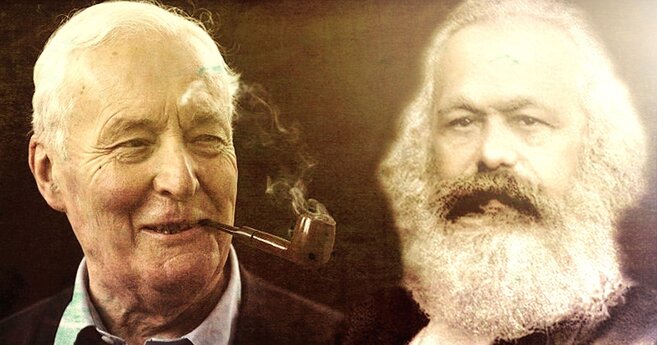


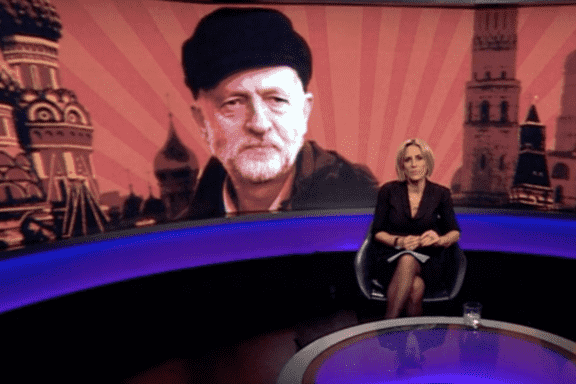
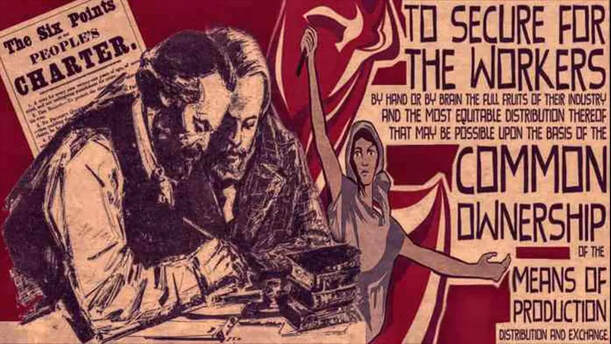
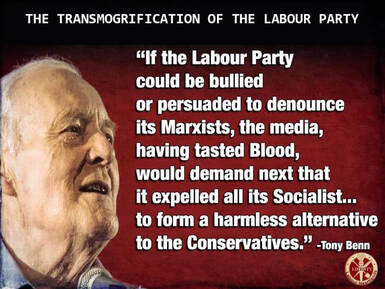


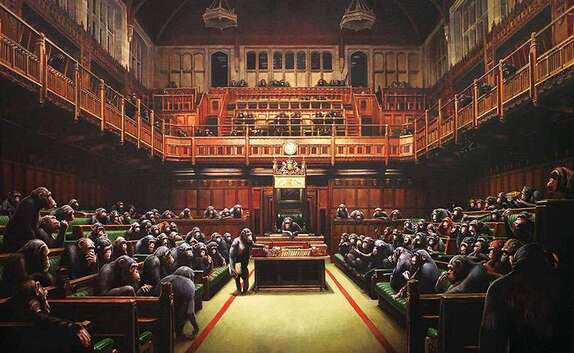
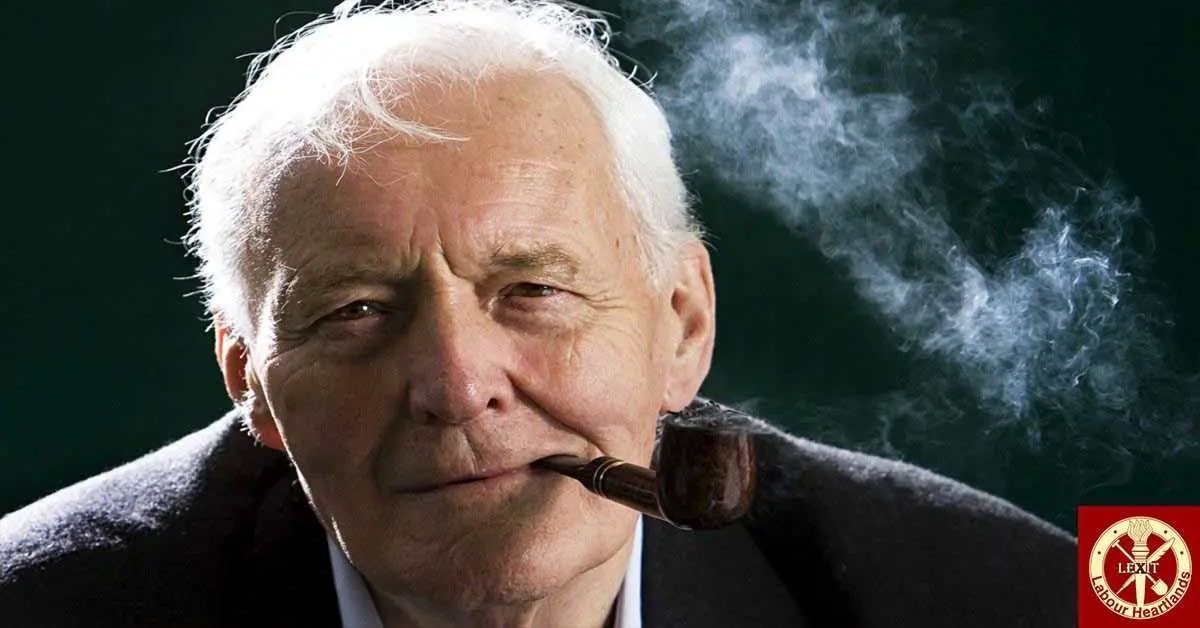
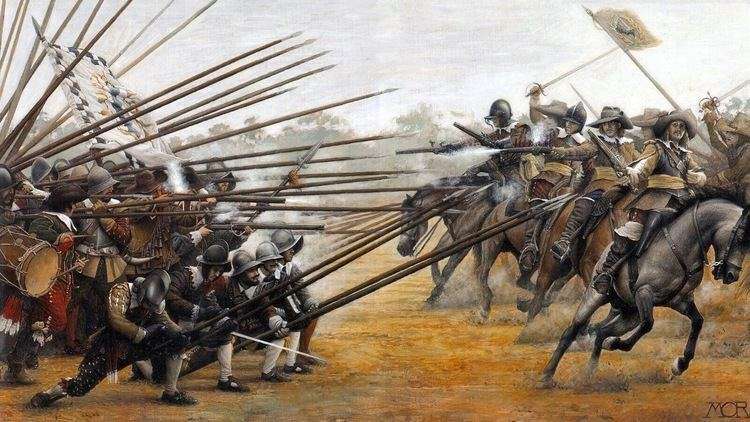

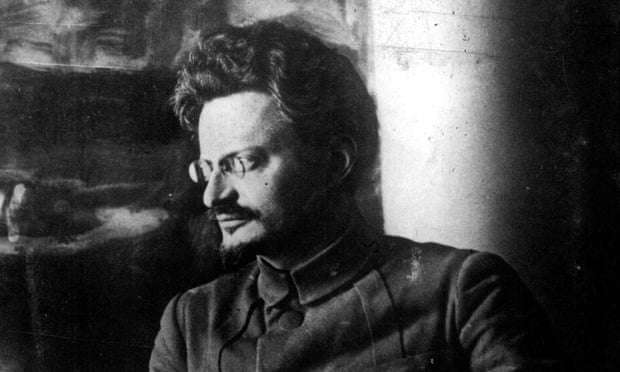








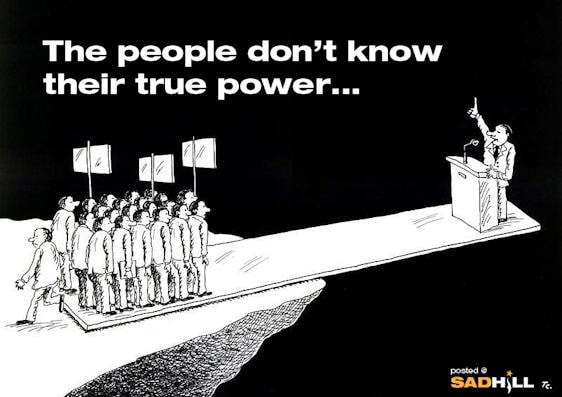


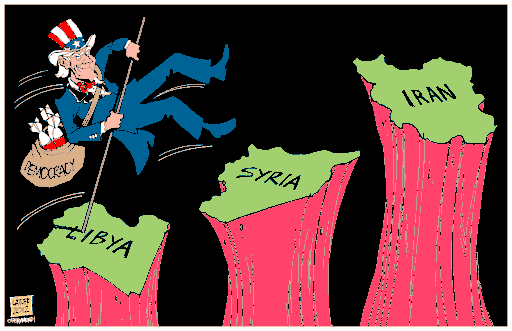

 RSS Feed
RSS Feed